Category: NYF News
Join us for Founder’s Day 2025 on May 29th!
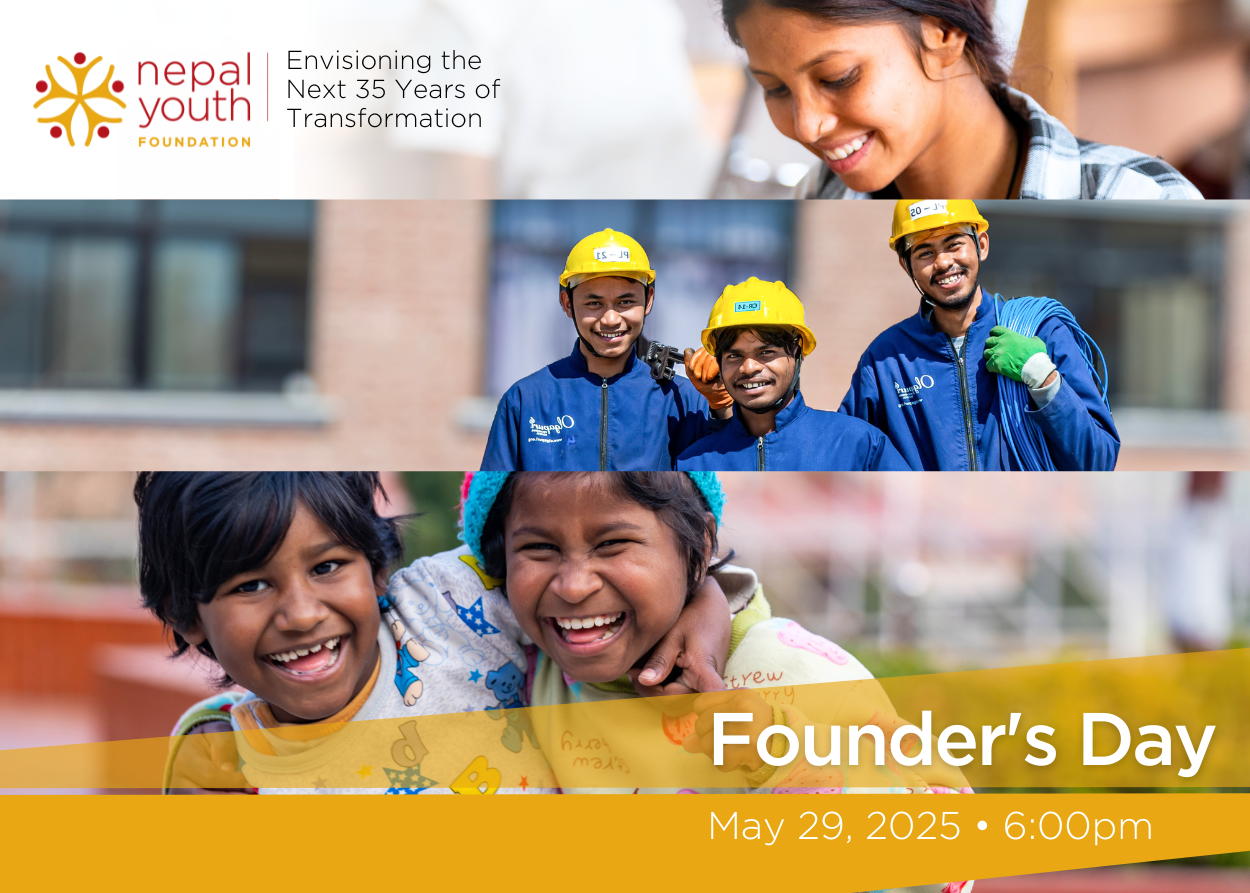
On May 29, 2025, the NYF Community will be gathering at the Golden Gate Club in San Francisco for Founder’s Day 2025: Envisioning the Next 35 Years of Transformation.
We hope you’ll join us for a special evening of dinner and drinks to celebrate three and a half decades of transformative work in Nepal. NYF President Som Paneru will be traveling from Nepal to lead the celebration, and together, we’ll also look ahead at the 35 years to come.
Last year, we renewed our shared promise to Nepal’s children, reflecting on the extraordinary legacy of our founder, Olga Murray. Founder’s Day 2025 will highlight Olga’s legacy in action through NYF alumni who have become today’s dynamic Nepali leaders.
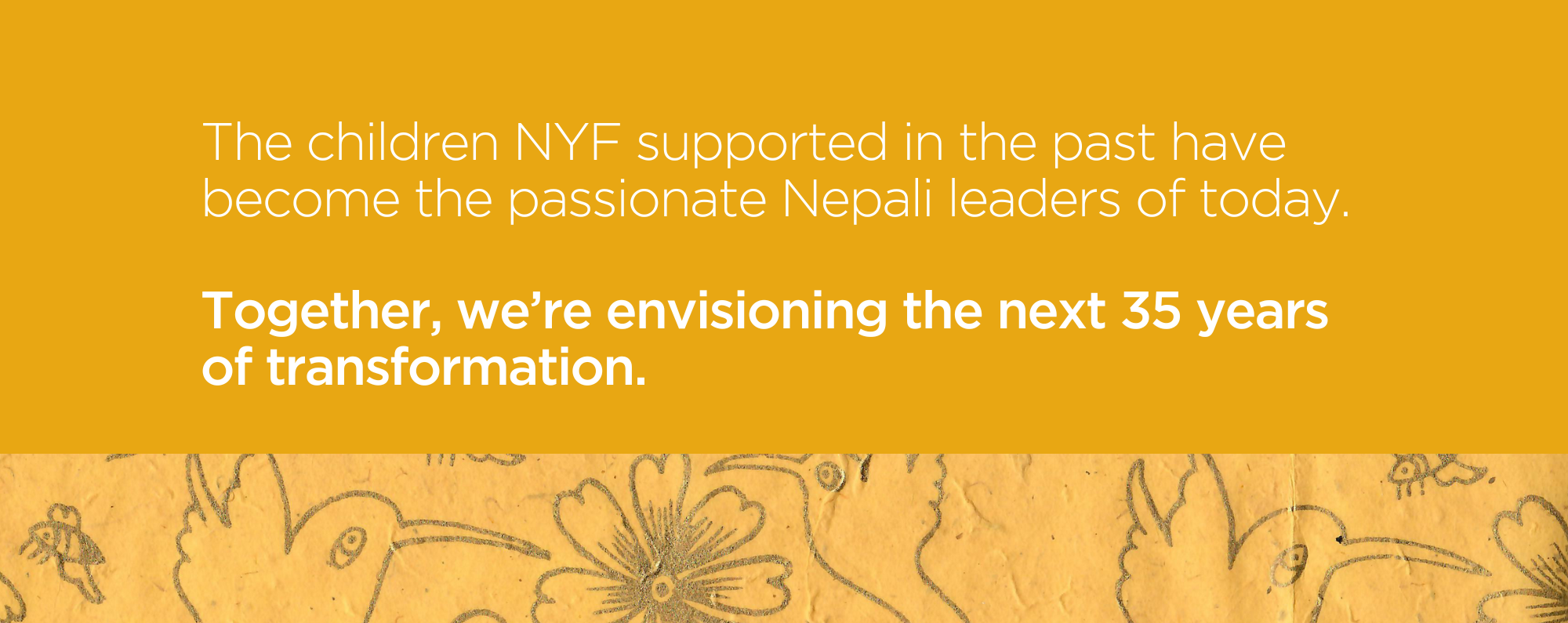
This year’s fundraising goal is $350,000.
Our time-tested programs are empowering community-led change across Nepal—and we’re just getting started. But we need your help to build upon this remarkable momentum. Founder’s Day is NYF’s biggest fundraising event of the year, and our goal this year is $350,000. Your 100% tax-deductible contribution in honor of Founder’s Day 2025 will empower and educate thousands of children, families, and young adults in Nepal this year. We hope the evening inspires you to support our continuing work!
Invite your friends to Founder’s Day 2025!
This year, there’s plenty of space to bring additional guests. In fact, one of the best ways to support NYF is by introducing new people to our work, so we would love for you to invite your friends and family to Founder’s Day! There’s no limit on guests, but please let us know who will be joining you so we can plan accordingly.
Our time-tested programs are empowering community-led change across Nepal—and we’re just getting started. We hope to see you there!
P.S. Founder’s Day will not be streamed live this year. However, we will have a recording available to all those who cannot join us in person. For more information or questions, please contact our US team at info(at)nepalyouthfoundation.org.
A Mother’s Day Story from NYF’s Nutritional Rehabilitation Home (NRH)
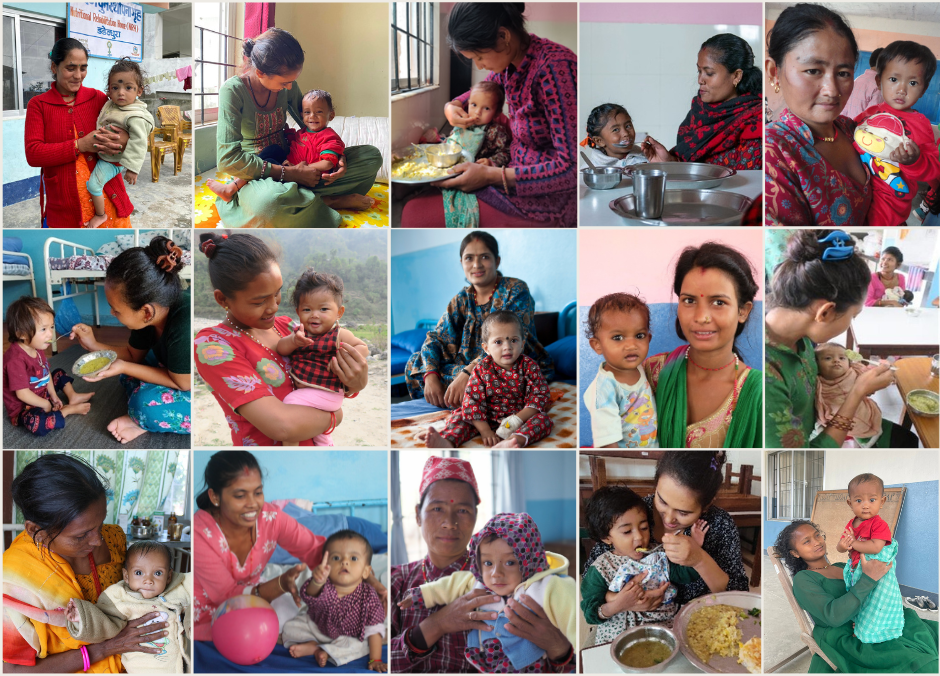
The below story is featured in NYF’s Health Special Impact Report—but with Mother’s Day around the corner, we knew it was the perfect moment to share it more broadly. As we honor moms around the world, we invite you to read about one mother’s extraordinary journey of love, resilience, and healing at our Nutritional Rehabilitation Home (NRH).
If you’d like to make a donation in honor of a mom or mother figure in your life, check out NYF’s special Mother’s Day eCards! These cards will support NYF’s Nutritional Rehabilitation Home in the Kathmandu Valley, where over 300 mother-child pairs receive life-saving medical care and nutrition counseling every year.
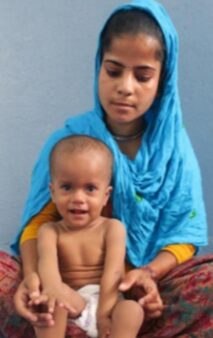
Meet 22-year-old mother, Kanchan*, and her seventeen-month-old child, Indu*
*names changed to protect the privacy of the individuals we work with
Seventeen-month-old Indu is the second child of Kanchan, 22. Indu was born several weeks early in their remote village. Over her first year of life, she gained weight very slowly, and she wasn’t hitting the developmental milestones she should.
Kanchan was only 13 when her family married her off to a 29-year-old man in the village. This match was intended to secure Kanchan’s future, but early marriage comes with significant health risks for young mothers and their children. Kanchan had her first child, a son, when she was 17. Motherhood was not what she expected, and bringing her son into the world took a toll on her health.
Kanchan didn’t know it, but she had been chronically undernourished for most of her life. This had impacted her own body’s development—a condition called “stunting.” Kanchan is shorter than she should be at her age, and much more physically delicate. Her still growing body was not prepared for the strain of childbearing. At age 21, during her pregnancy with her daughter, Kanchan had limited access to prenatal care. She lost weight, and she was constantly exhausted. Iron Deficiency anemia made her dizzy and unable to work. Virtually all the nutrients she consumed were going towards her growing baby instead of bolstering her own health.
Because Kanchan’s body was still underdeveloped, she was not able to carry Indu to term and went into labor several weeks early—a common occurrence in villages like theirs. Indu was quite small, too. Babies who are born early often struggle to suck and swallow, making it difficult to eat. Their bodies also expend more energy struggling to keep warm, rapidly burning calories instead of turning them into growth. From the very beginning, little Indu was frequently sick.
Kanchan was overwhelmed by her baby’s health challenges. She couldn’t help but feel like she was failing.
A Lifesaving Transfer to NYF’s NRH
Finally, in desperation, Kanchan brought her daughter to the nearest clinic for help. The nurses there knew Indu needed care at a Nutritional Rehabilitation Home (NRH) right away, and they contacted NYF to arrange immediate transportation to the nearest location—our flagship Kathmandu Valley NRH.
Soon, Kanchan was climbing anxiously into NYF’s ambulance van, holding Indu close. The driver, Naresh Tuladhar, smiled reassuringly, and as they began their journey, he asked about Indu. Naresh’s own son, Rinof, had once spent time at the NRH as well, he said. When Rinof was only 10 months old, he had nearly died, and Naresh and his wife, Rijana, were in despair. But the NRH had saved Rinof’s life. Today, Rinof is 18 years old, vibrant, healthy, taller than both of his parents. Time at the NRH would do the same for Indu, Naresh said confidently. It sounded too good to be true. But Kanchan hoped he was right.
(To read more about Niresh and Rinof’s story, visit https://nyf.news/rinof.)
Immediate Care and Compassion
When Kanchan and Indu arrived at the NRH, the baby was extremely thin, dehydrated, listless, and barely responsive. NRH Manager Sudha Maharjan met them as they climbed out of the ambulance, whisking them inside. NYF’s nurses, cooks, and nutritionists leapt into action, providing fluids and medicine to Indu right away to help stabilize her. Our team saw right away that Kanchan was also malnourished. Kanchan was surprised that some experts were focused on her, giving her a warm, balanced meal as they gently asked questions about her own health.
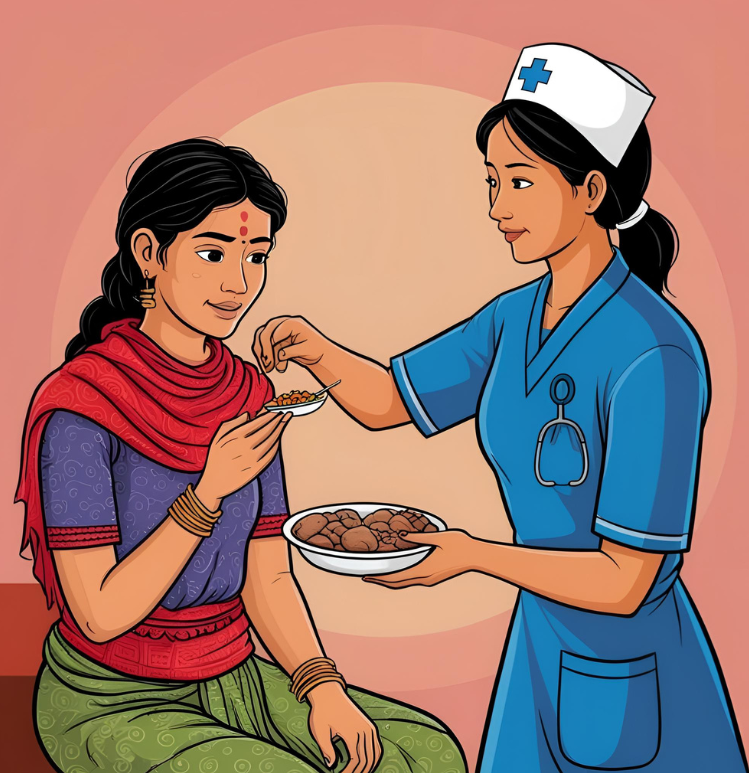
Kanchan was amazed at how much Indu had improved even after one night of treatment, with appropriate hydration administered by attentive nurses. Nurse Rashmi Shrestha explained to her, with a bright, friendly smile, the vital importance of keeping sick children well-hydrated, especially when they have diarrhea. It didn’t feel like a lecture or a scolding—more like a helpful lesson received from an older sister or an auntie. And this was only the first lesson!
Five Weeks of Transformation
During a five-week stay at the NRH (longer than average, due to the severity of the situation), both Indu and Kanchan underwent a health transformation. The nurses shared with Kanchan that her chronic exhaustion was due to micronutrient deficiencies like anemia. Within a few days of taking multivitamins and eating the balanced meals provided, Kanchan began feeling stronger, more energetic, and more upbeat than she’d felt since before Indu was born.
Meanwhile, baby Indu was putting on weight and becoming much more interactive, exploring the toys available in the playroom, babbling cheerfully, and laughing with other young patients. Kanchan discovered that Indu loved fruits—especially bananas. Learning and practicing new techniques for preparing nutritious meals became more rewarding and empowering with each passing lesson.
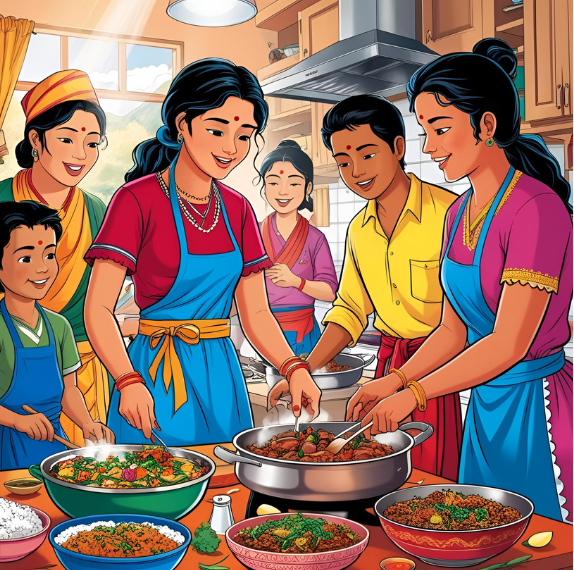
A Safer Future for the Whole Family
The nurses also explained the importance of family planning to Kanchan, carefully checking that she felt safe in her home. Child marriage is illegal in Nepal, but it is still a very common practice, especially in more rural regions of the country. NYF is committed to meeting individuals where they are—and Kanchan was determined to return home to her husband.
However, because her body is unlikely to grow any more, any further childbearing would be highly dangerous for her health. NRH nurses discussed these dangers with both Kanchan and her husband, as well as their available family planning options. Kanchan’s husband decided to have a vasectomy. He had the operation before Kanchan and Indu left the NRH!
When Kanchan and Indu returned to their village, Indu was barely recognizable: a joyful, exuberant toddler on the verge of taking her first steps. Six months later, when NRH Field Supervisor Ramesh Pant visited their village for follow-up, both Kanchan and Indu had continued their progress towards a brighter, healthier future.
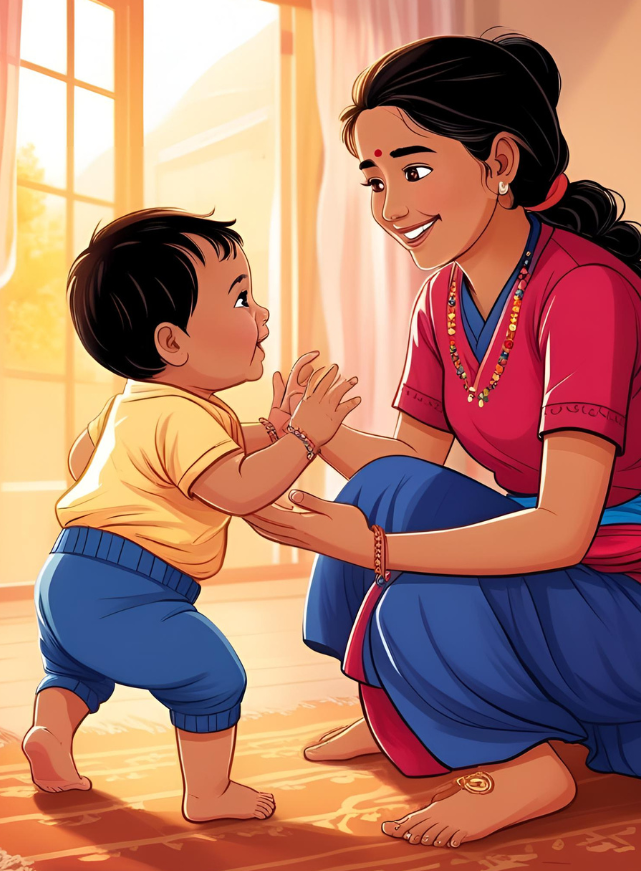
A Proven Model: NYF’s Nutritional Rehabilitation Homes
Kanchan and Indu’s journey is just one of hundreds made possible every year at NYF’s Kathmandu Valley Nutritional Rehabilitation Home (NRH)—the only facility of its kind still fully operated by NYF. This special clinic doesn’t just save the lives of children facing severe malnutrition. It empowers caregivers—primarily mothers—with the tools and knowledge to sustain wellness at home.
In just three weeks, for $500 per caregiver-child pair, NYF’s holistic, food-based care approach transforms futures:
- 324 families received full in-patient treatment between July 2023 and June 2024.
- 1,161 additional adults and professionals received nutritional training.
- Over 90% of children treated maintain improved health six months after discharge.
Our NRH model is so effective it’s been adopted nationwide by the Nepali government and major aid organizations. But the Kathmandu Valley NRH remains a cornerstone of innovation, training, and action-based research—serving children in the greatest need with warmth, dignity, and care.
NYF Mother’s Day eCards
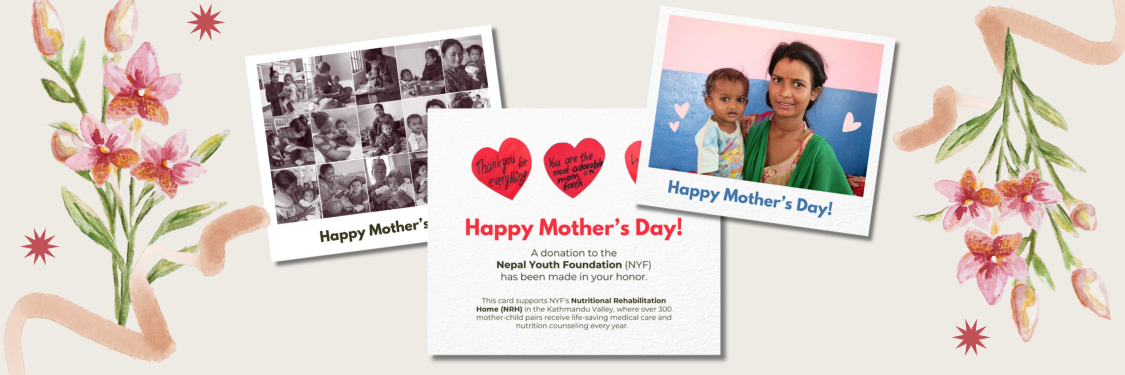
This Mother’s Day, you can be part of this extraordinary work by honoring a mother or mother figure in your life with a heartfelt donation to NYF’s NRH. Your gift will support life-saving medical care, nutritional therapy, and caregiver empowerment for families like Kanchan and Indu’s.
When you make a donation of any amount, your honoree will receive a beautiful Mother’s Day-themed eCard. And you’ll be giving a gift that brings health, hope, and healing to another mom and child across the world!
Choose a Mother’s Day eCard and give a gift that gives back.
Nepal’s 2015 Earthquake: 10 Years Later

A Day That Changed Everything
As we mark the 10th anniversary of Nepal’s 2015 earthquake, we pause to reflect on a day that forever changed the country. Just before noon on April 25th, 2015, a 7.8 magnitude earthquake struck Nepal, centered in Gorkha District—the worst natural disaster to hit Nepal since 1934. Nearly 9,000 lives were lost and over 21,000 people were injured. An avalanche on Mount Everest claimed 22 more lives, making it the mountain’s deadliest day in history.
The destruction was staggering: ancient temples, monasteries, and entire villages near the epicenter were reduced to rubble. In mere moments, nearly 3.5 million people were left homeless. Powerful aftershocks continued for weeks, causing further devastation and uncertainty. Amid this ongoing crisis, the Nepal Youth Foundation (NYF) mobilized quickly—delivering critical relief and support to the communities who needed it most.
While the statistics are staggering, it is the personal stories that reveal the true impact of this disaster. And the remarkable resilience of the Nepali people.
Sanam’s Journey: A Story of Strength and Determination
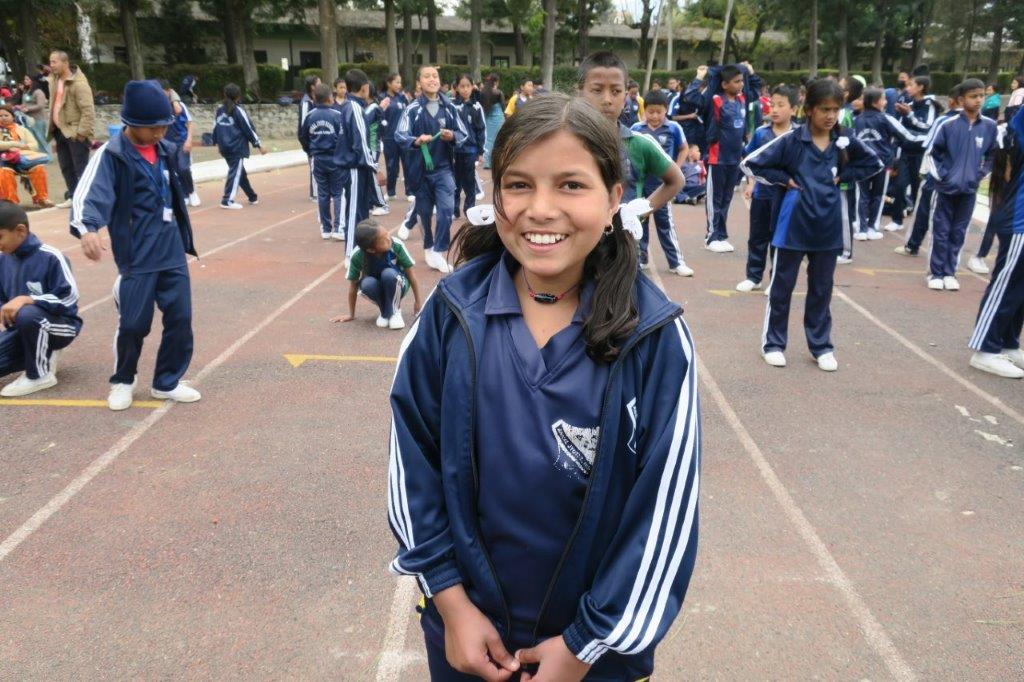
Among the thousands of lives touched by the 2015 earthquake is that of Sanam*—a young girl whose determination and resilience continue to inspire all who meet her. Sanam was just 8 years old when the earthquake struck her village. As she and her neighbors rushed outside towards safety, two houses collapsed on top of her, crushing one of her legs. Her neighbors urgently freed her from the wreckage and carried her to the hospital as quickly as possible. They reached the hospital before Sanam’s father even made it home from the fields.
Unfortunately, Sanam’s leg could not be saved. “My leg had been totally damaged,” she remembers.
She later received a prosthetic leg from another organization, helping her regain mobility. Her family was already facing challenges, and after the earthquake, Sanam shared, “[We] did not have enough to eat. And I thought now I would never be able to study and do anything.”
Even after such a life-altering event, Sanam stayed focused on her future and her education.
Through NYF’s Scholarships for Students with Disabilities program, she was able to pursue her academic dreams. She recently shared with a member of our team, “Before NYF’s support, I was not getting the proper education that I deserved. But NYF’s scholarship proved me wrong. I feel like I have got everything now—my health and a good education, and I will be able to acquire wealth when I grow up. So NYF has given me happiness and a bright future.”
Sanam’s journey is about more than overcoming adversity; it’s about forging her own path forward. Both of her elder sisters were married by the age of 16, a common reality for many girls in her community, but as Sanam says, “I feel lucky that I am able to go to school and study without fear of marriage.”
This year, now age 18, she passed her Grade 10 board exams and recently sat for Nepal’s School Education Examination (SEE)—a major milestone in every Nepali student’s academic journey. As she waits for her results, Sanam is practicing guitar and dreaming of one day becoming a singer.
Sanam’s story is a testament to her resilience and ambition. With support, she is building the life she chooses—one filled with hope, learning, and music.
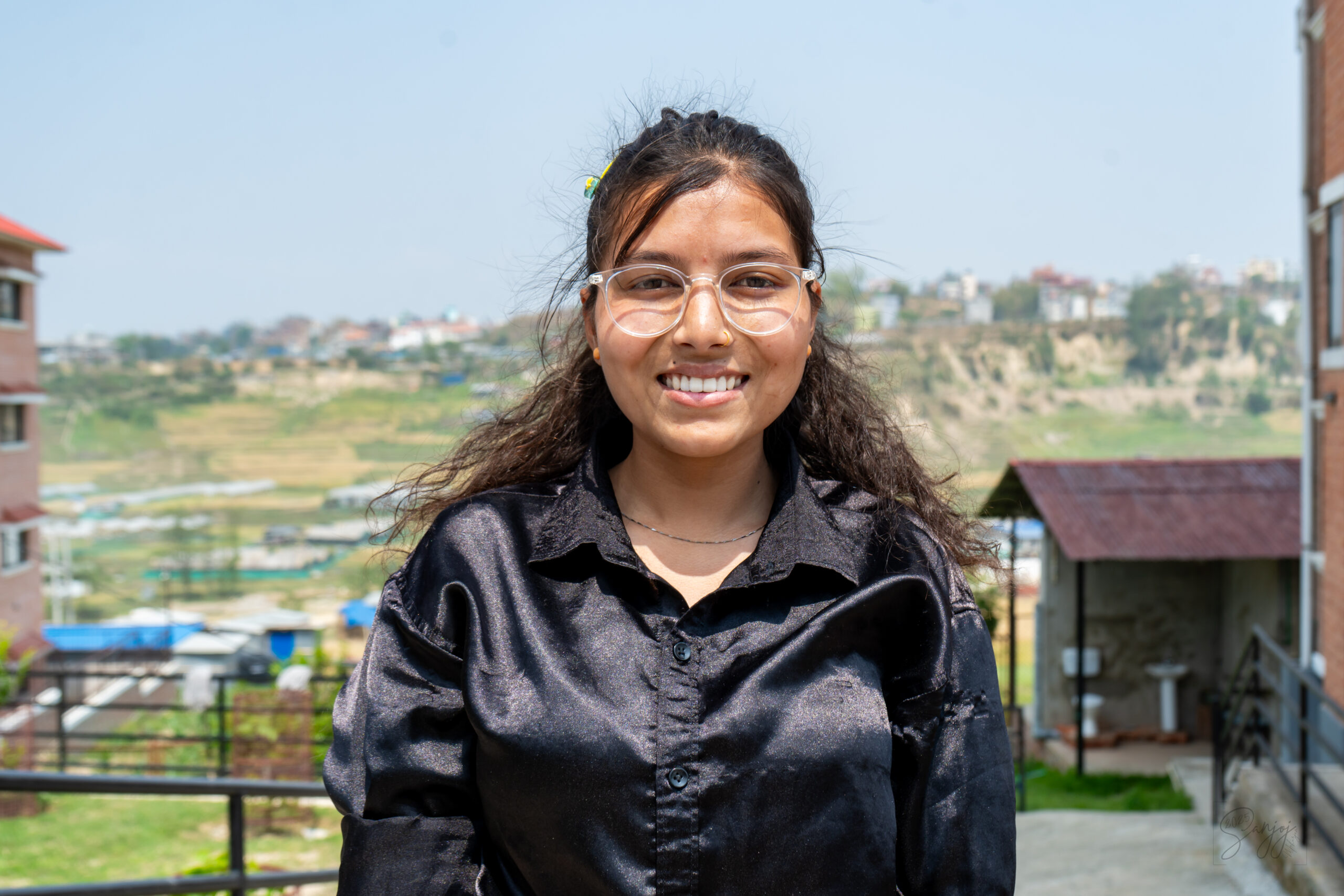
In the years following the disaster, NYF has supported thousands of children and families as they navigated the path from survival to renewal. Each story is unique, and together, they are a testament to what is possible when a community comes together to uplift its own.
NYF’s Swift & Sustained Response to the 2015 Earthquake
Sanam’s experience is just one window into the broader work of NYF in the aftermath of the earthquake.
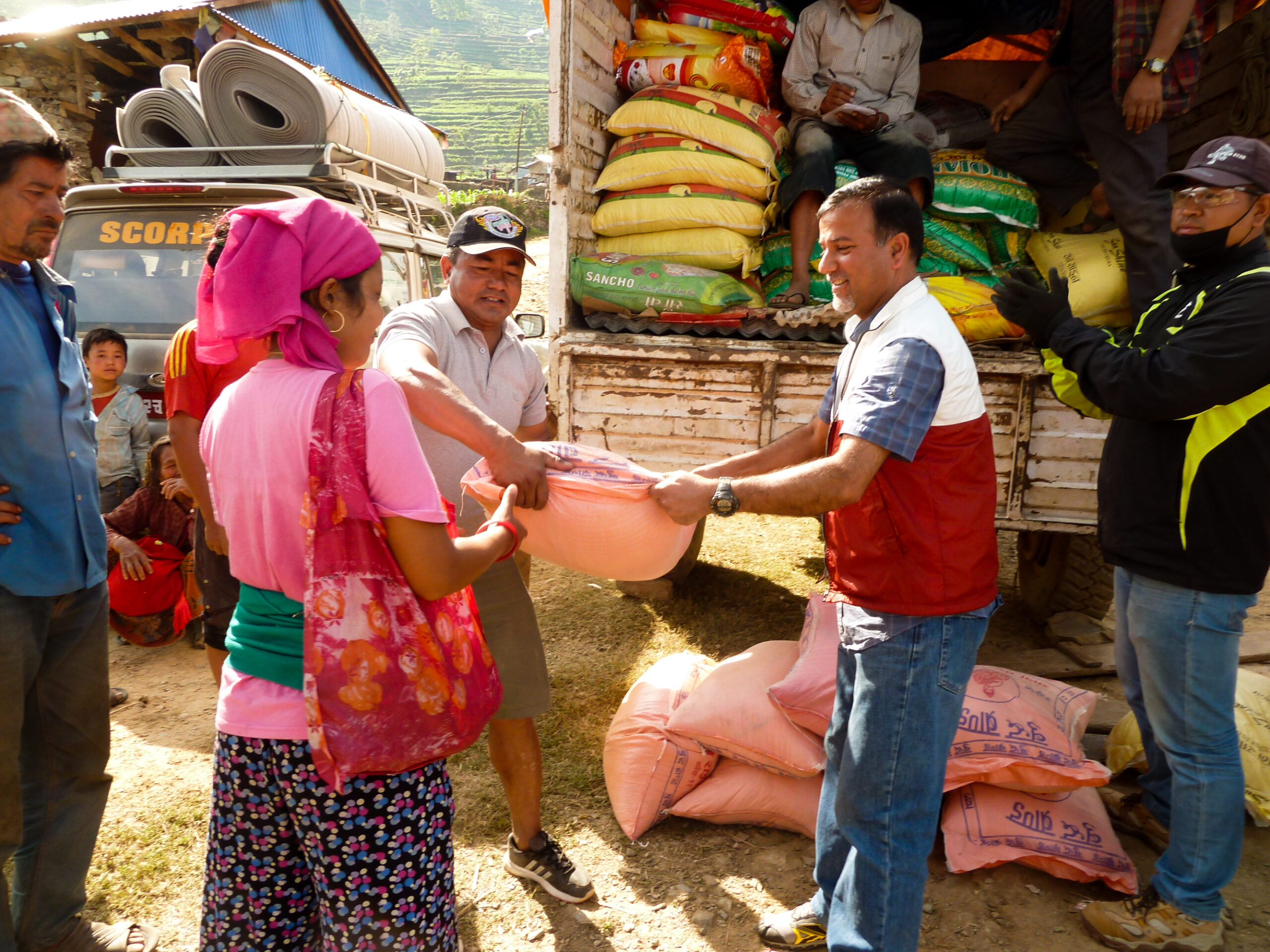
Within days, NYF was providing emergency shelters and medical supplies. Soon, we established protective housing for displaced children and eventually began supporting communities to rebuild schools and homes. Our relief programming, which ran through 2017, reached the nine districts closest to the epicenter and inspired much of our later work, including our COVID-19 response.
With decades of experience and deep community roots throughout Nepal, our team was able to pivot swiftly to meet urgent needs where they were greatest. As ABC7 News shared at the time, NYF founder Olga Murray—then 89—rallied support from her home in Sausalito, California, while our staff in Nepal coordinated and delivered critical relief on the ground. Together, we reached thousands of families across the hardest-hit districts with compassion, efficiency, and care.
Our emergency and long-term recovery work included:
- Temporary housing and essential supplies for over 2,000 families
- Emergency psychological support for 4,600+ children and adults
- Distribution of over 30,000 units of essential medicine
- Safe drinking water systems and hygiene kits for displaced communities
- Construction of 51 earthquake-safe classrooms
- Over 10,000 backpacks and school supply kits to help children return to learning
- Nutrition support for children and mothers in crisis

A Legacy of Care and Readiness
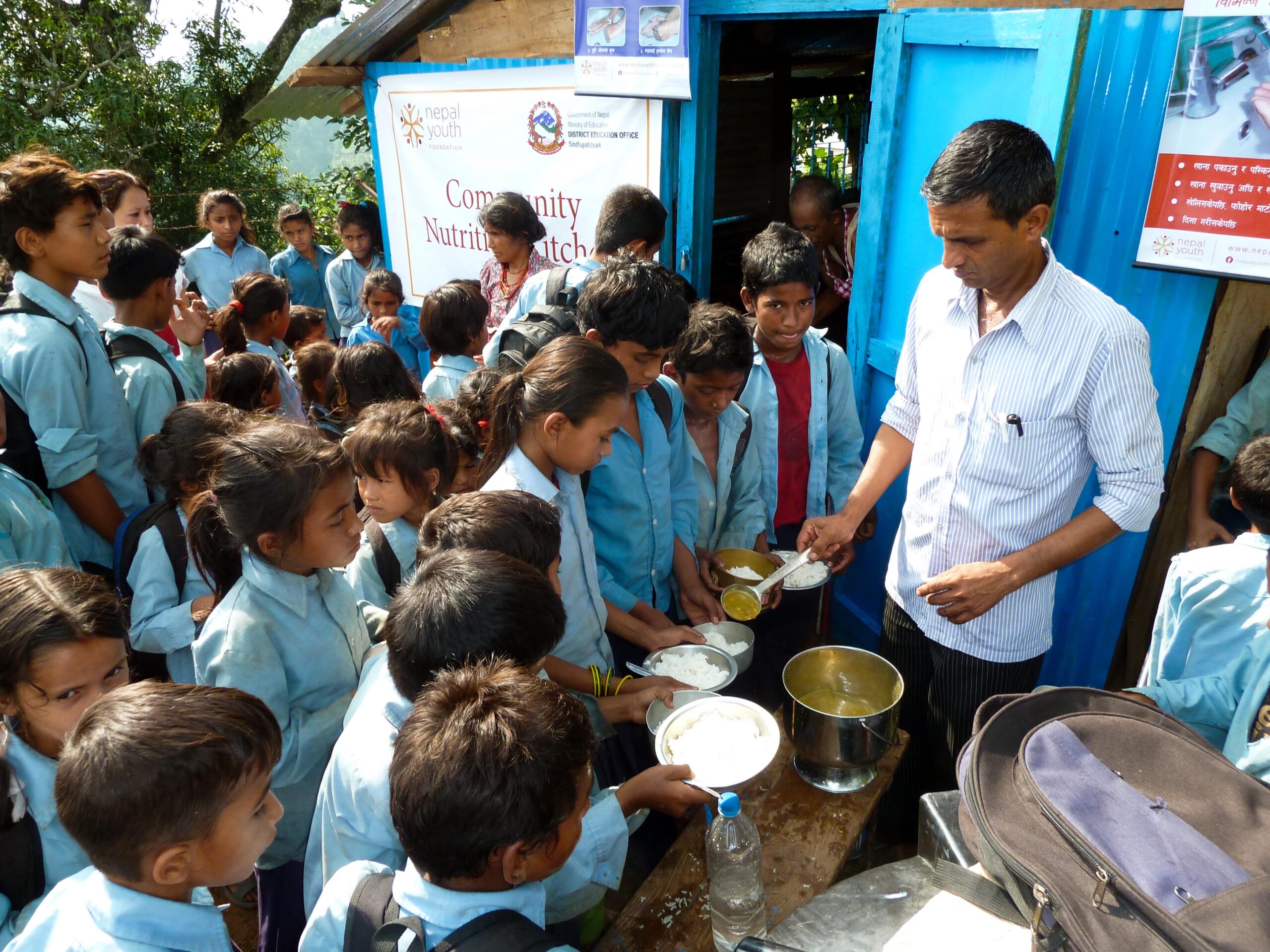
As we mark this 10-year anniversary, we remember the lives lost, honor the communities forever changed, and reaffirm our commitment to standing with children and families—especially when they need us most.
At NYF, we believe in showing up—not just during emergencies, but for the long road that follows. Whether it’s an earthquake, a pandemic, or a personal crisis, our team responds with compassion, cultural knowledge, and an unwavering belief in the potential of every child.
This commitment was evident again during the COVID-19 pandemic. Drawing from the lessons we learned in 2015, we acted quickly, distributing food and hygiene supplies, offering remote mental health services, and converting our Nutrition Kitchens to prepare over 5,000 hot meals for hungry families. We provided emergency housing, education continuity, and support for frontline hospitals, all while ensuring the children in our care remained safe, healthy, and nurtured during an incredibly uncertain time. Our decades-long presence in Nepal has made us a trusted partner in both urgent relief and long-term recovery—and none of it would be possible without the generosity of our global community.
Thank You for Standing with Us
To everyone who stood with us in 2015—and every year since—thank you. You’ve helped rebuild homes, restore hope, and empower thousands of new beginnings. Dhanyabad!
Join us at Founder’s Day 2025
At Founder’s Day 2025, NYF will highlight Olga Murray’s legacy in action through inspiring alumni who are now shaping Nepal’s future. If Sanam’s story moved you, we invite you to join us on May 29th in San Francisco to hear even more firsthand accounts of resilience, hope, and transformation. We’ll be celebrating 35 incredible years of NYF’s impact over dinner and drinks—and would love to see you there!
NYF’s College Graduates: Where are they now?
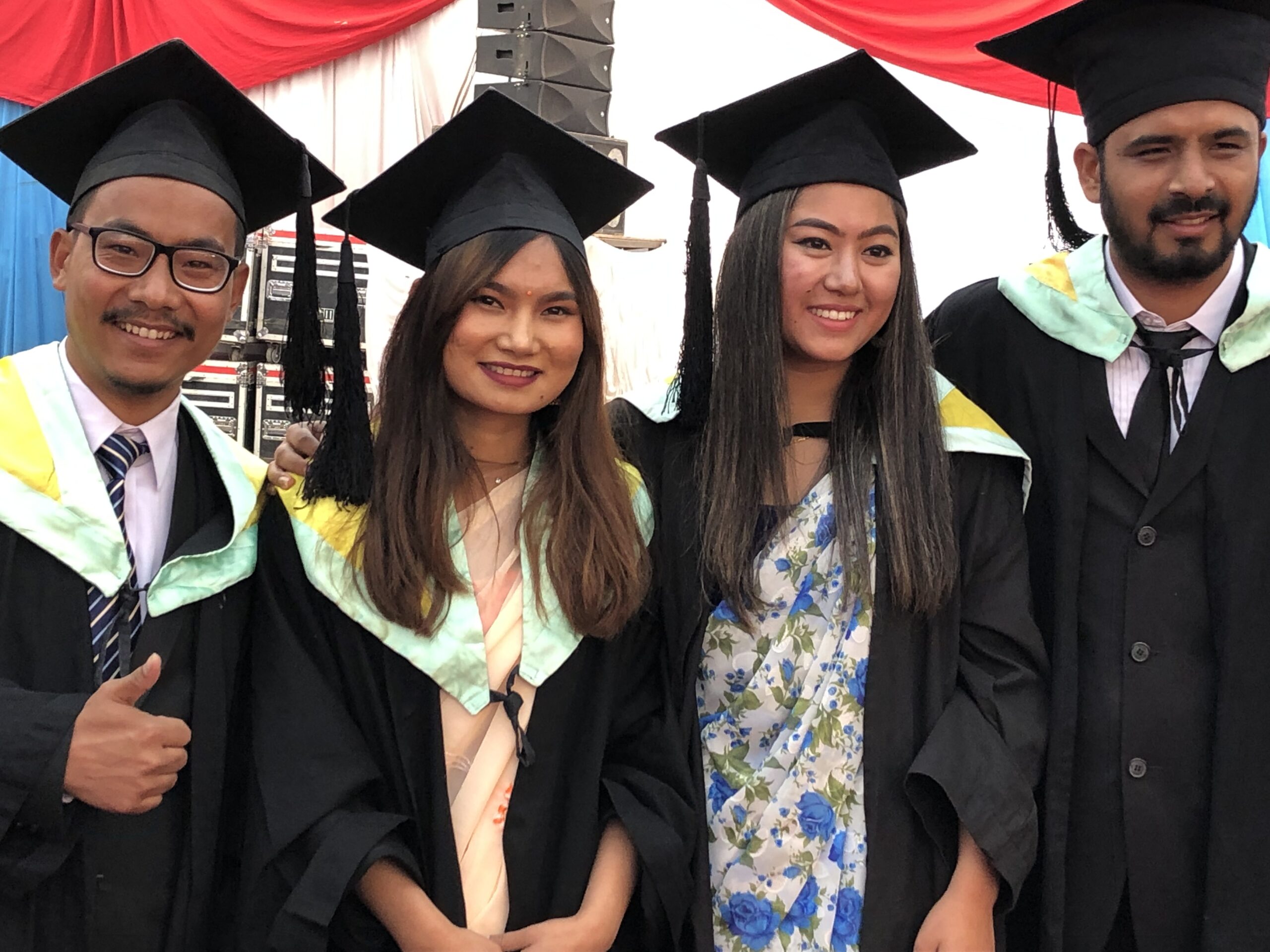
At Nepal Youth Foundation (NYF), we’re committed to ensuring that every young person we support has the tools they need to thrive. But how do we measure success?
Every five years, NYF conducts an internal survey of recent college graduates to assess the long-term impact of our Scholarships for K-12 and College Students program. This year, we reached out to all 358 students who earned their bachelor’s degrees with NYF’s support between 2017 and 2022. Of the total 358 graduates, 52% were men and 48% were women. Despite the challenges of maintaining contact across five years and many regions, 326 graduates (91%) responded.
The results were deeply encouraging.
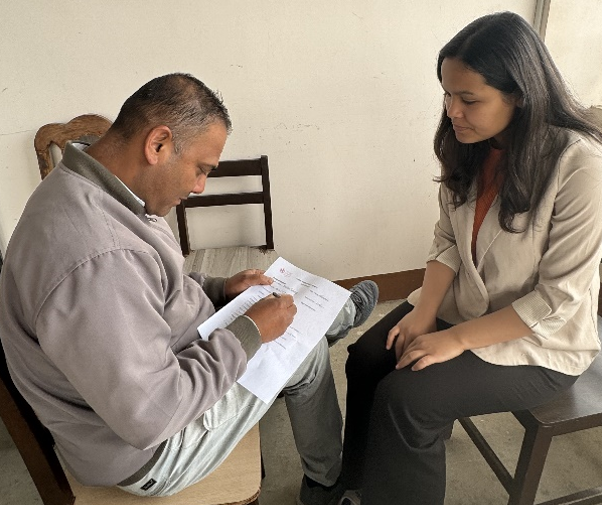
The Results

The data speaks volumes. Nearly 9 in 10 NYF college graduates are employed, and 100% of them are earning more than the national minimum for their field—a powerful indicator of both job quality and long-term stability. Meanwhile, 11% are pursuing advanced degrees in high-impact fields like medicine and agriculture, continuing their academic journeys with purpose.
More than two-thirds have already reached officer-level positions or higher, just a few years after graduation—a testament to their leadership potential and the value employers see in their NYF-supported education. And with 7% working in medicine and 11% earning competitive government placements, it’s clear that these young professionals are stepping into sectors critical to Nepal’s future.
These achievements are even more remarkable when viewed in context. This cohort of students faced extraordinary disruptions during their education—graduating into the uncertainty of a pandemic, navigating remote learning, exam delays, and a drastically shifting job market.
Behind the Data
The young people represented in this survey are part of NYF’s College Scholarship program, which supports students who have already overcome significant challenges to pursue higher education. Many began their journey with NYF as children in our K-12 Scholarship or Shelter programs, and with consistent support and mentorship, advanced to college—often gaining admission to some of Nepal’s most prestigious institutions.
Between July 2023 and June 2024 alone:
- 331 students (168 men and 163 women) received NYF College Scholarships.
- 64 students graduated from bachelor’s and master’s programs.
- Fields of study included medicine (11), nursing (2), business management (20), social science (13), law (2), and programs like agriculture, education, and science.
This diversity reflects NYF’s commitment to nurturing well-rounded, empowered leaders across every sector—and it signals a brighter, more resilient future for Nepal, as these graduates bring their skills and insights into every corner of society.
Rising Above Adversity
These scholars are not just high achievers—they are survivors and change-makers.
Some have faced caste-based discrimination in their classrooms, including the injustice of untouchability. Others have been underestimated due to their gender, with parents reluctant to invest in a daughter’s education. Still others are the pride of remote villages, supported by neighbors who pooled whatever they could to help a child succeed.
They’ve grown up during pivotal moments in Nepal’s history. They were toddlers—or not yet born—when the Civil War ended in 2006. They were in school when the 2015 earthquake shook the nation, and in their teens when the COVID-19 pandemic turned the education system upside down.
Through all of this, they’ve kept moving forward.
Supporting students through these challenges requires more than just funding—it takes a team that understands, listens, and walks alongside them at every step.
Meet the Team Powering NYF’s Scholarship Success

Behind every successful NYF graduate is a small but mighty team of passionate, devoted experts. NYF’s Academic Education team combines technical expertise with deep empathy—many having faced similar challenges as the students they support. Through meticulous record-keeping, regular field visits, and personal check-ins, they provide the personal touch that sets NYF apart. Their work isn’t just about education—it’s about building trust, opening doors, and creating lasting opportunity.
Investing in Nepal’s Future
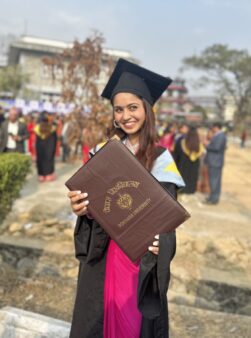
Rojina completed her 4-year course in Public Health and is currently working as an intern at a Maternity & Reproductive Health Care Center in Kathmandu. She and her younger brother have been under the care of NYF since 2005.
Today, NYF college graduates are thriving—not just building careers, but contributing meaningfully to Nepal’s development. They’re leading in healthcare, business, education, agriculture, and beyond. And with every success, they’re paying it forward—strengthening their families, uplifting their communities, and helping to shape a brighter, more equitable future for Nepal.
We are incredibly proud of each and every one of them—and so grateful to you, our NYF community, for making these stories possible.
At Founder’s Day 2025, NYF will highlight Olga Murray’s legacy in action through alumni who have become today’s dynamic Nepali leaders. If you like what you’ve read, please join us at Founder’s Day on May 29th in San Francisco to hear more about NYF’s incredible alumni. We’ll also be celebrating 35 incredible years of impact over dinner and drinks! You can RSVP online for free here.
RSVP Here
Transformative Career Opportunities in Dhangadhi through Vocational Training
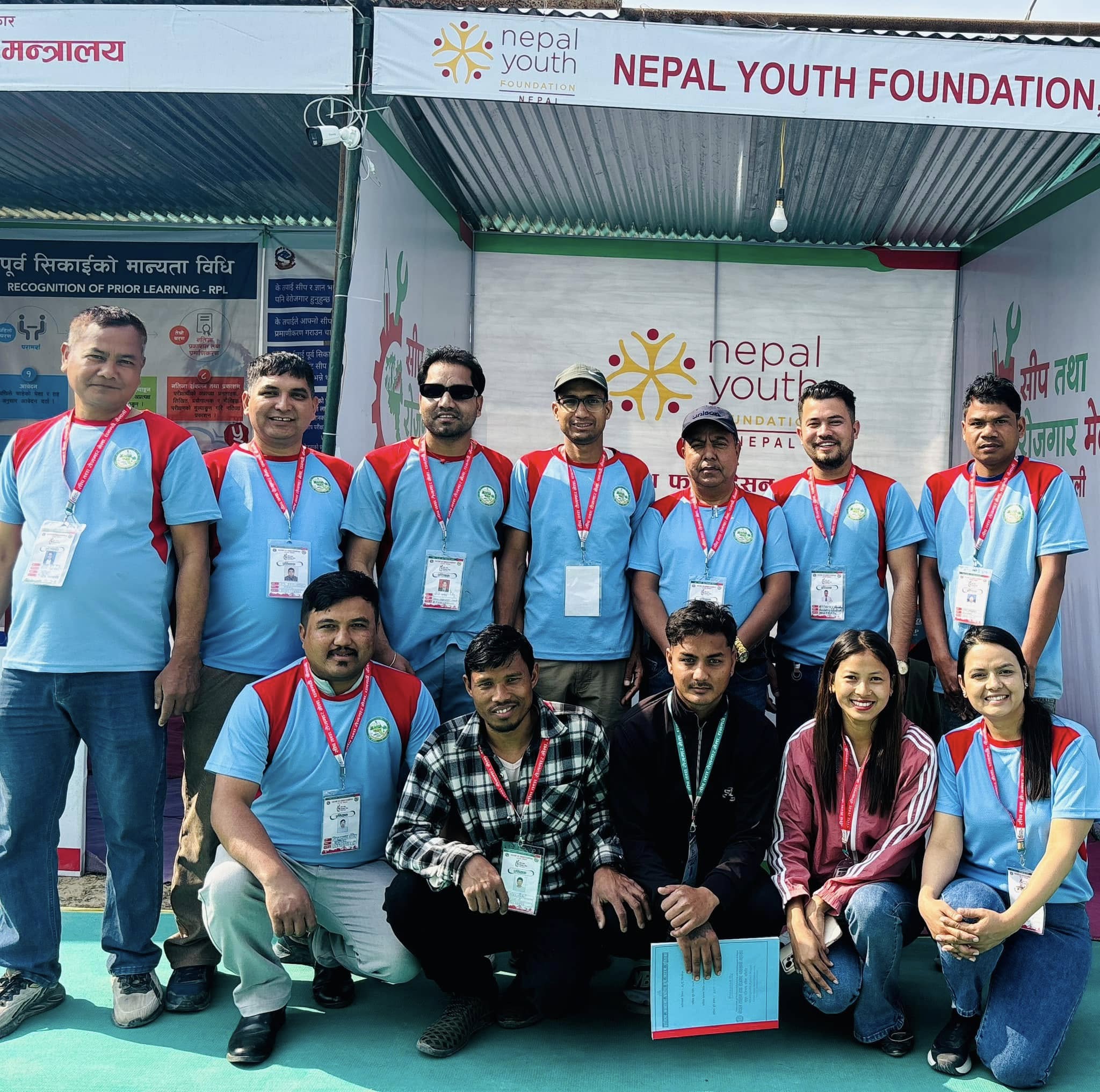
Transformative career opportunities, like those offered through Olgapuri Vocational School (OVS), allow Nepali young people to begin building economic independence and even generational wealth. But that’s just the beginning.
Communities all over Nepal are eager to upgrade their standard of living, whether by improving clean water access, making electrical connection more reliable, or scaling up local vegetable production. These changes transform villages, impacting public health, access to outside resources, educational opportunities, and much more. But in many rural areas of the country, young people struggle to access the skills training required to enter these industries.
Development in Nepal’s “far western” province, Sudurpashchim Province, has fallen behind most of the country. But NYF is working with local leaders to turn the tide.
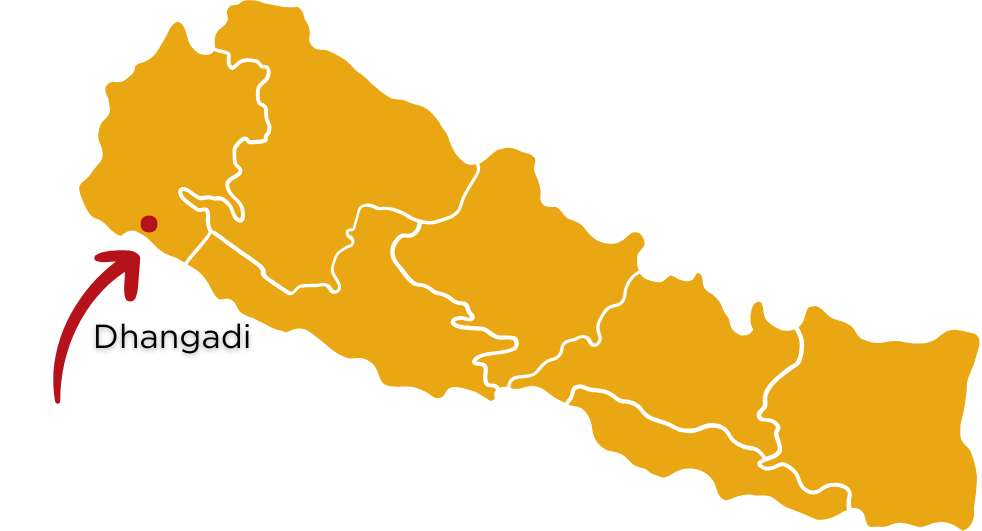
Skill Fair: Connecting Youth to Employers
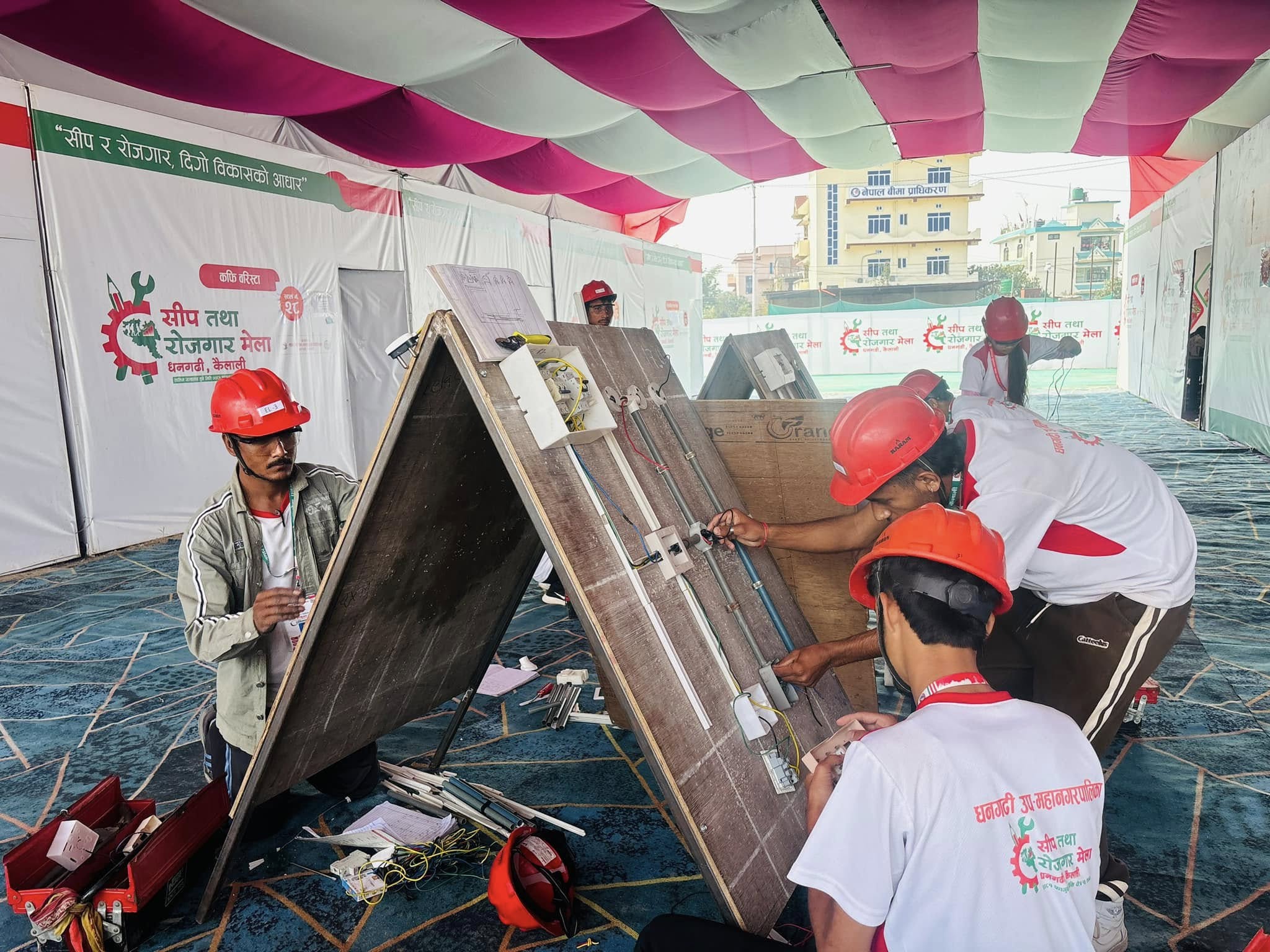
In early March 2025, Olgapuri Vocational School (OVS) participated in the Skill and Employment Fair in western Nepal. This event, organized by Dhangadhi Sub-Metropolitan City, provided hands-on training opportunities for young adults eager to enter the workforce.
Out of 4,800 applicants, 1,040 youth from Sudurpashchim Province were selected to participate. OVS trained 181 of these individuals across seven high-demand trades, equipping them with the skills needed for sustainable employment:
- Air Conditioning & Refrigeration
- Barbering
- Electrical
- Fast Food Preparation
- Furniture Making
- Plumbing
- Welding
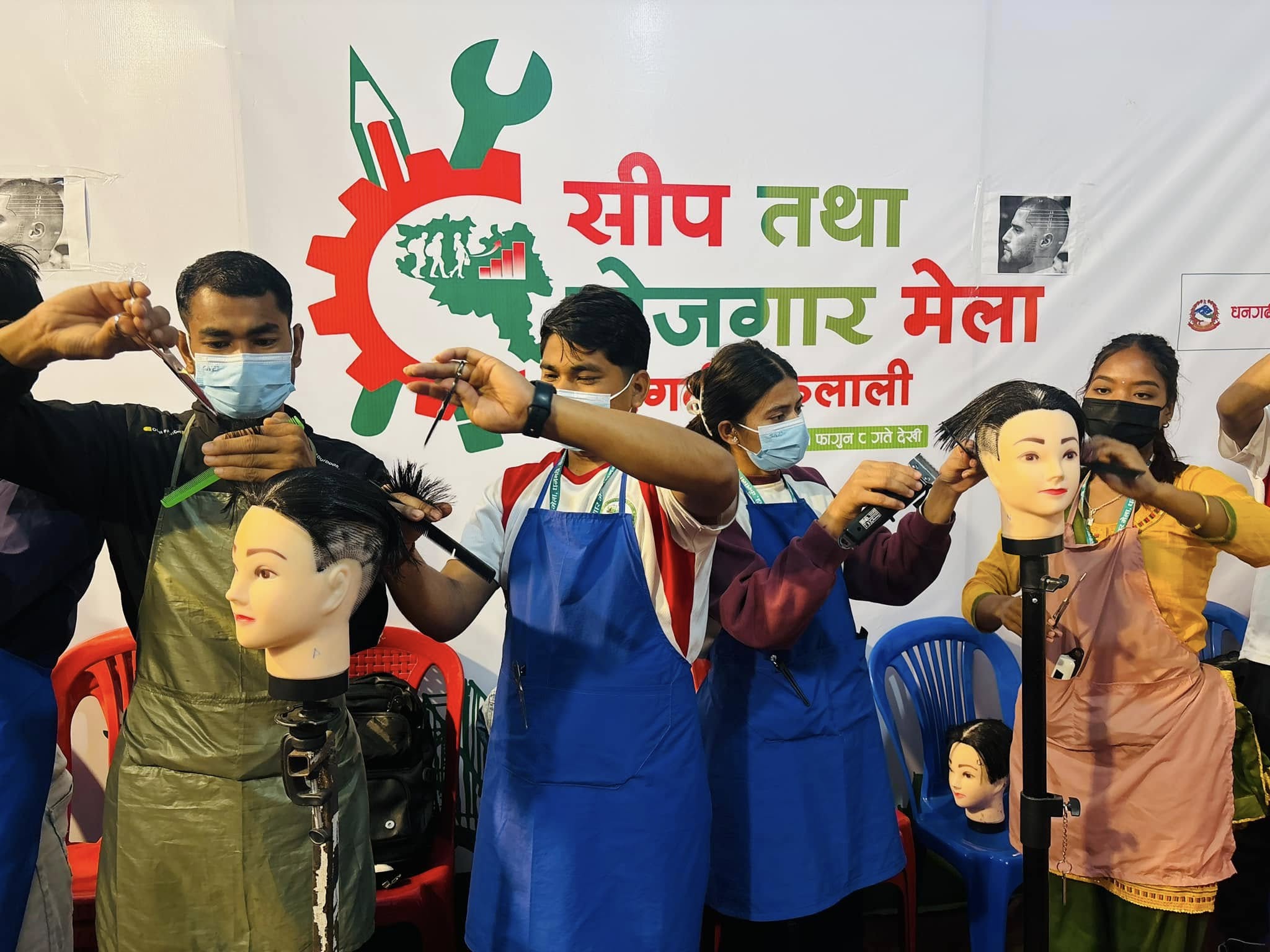
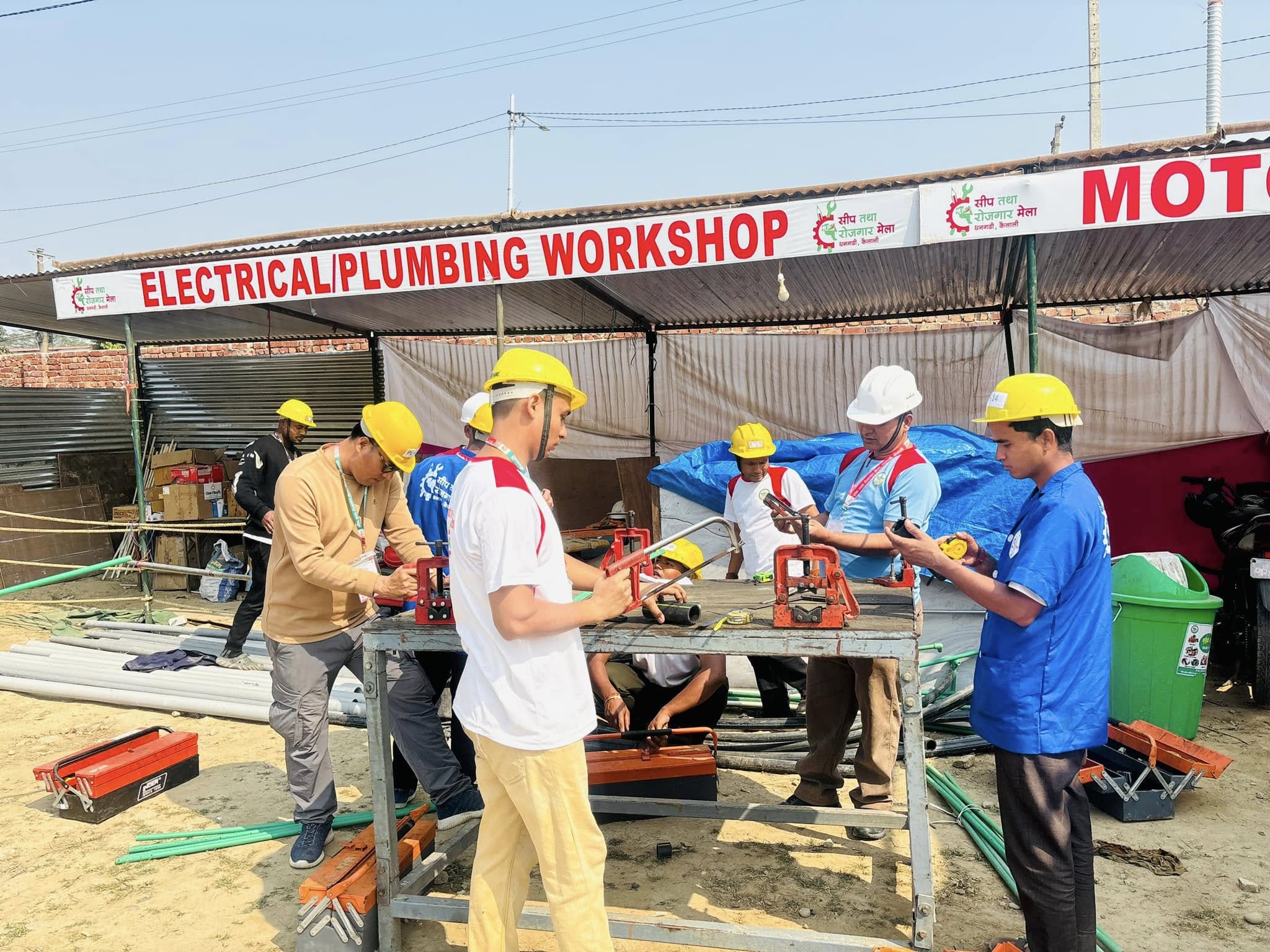
These fields offer strong job prospects, helping participants gain financial independence and contribute to their local economies. Notably, 50% of the trainees were women, reinforcing NYF’s strong commitment to gender equity and economic empowerment.
By connecting skilled trainees with employers, the Skill and Employment Fair played an essential role in bridging the gap between education and workforce development, ensuring that Nepal’s youth can build rewarding careers and contribute to the growth of their local communities.
But this fair was only one small part of NYF’s work in this area of the country.
As the district headquarters of Kailali District (one of nine districts in Sudurpashchim Province), Dhangadhi Sub-Metropolitan City is home to a dynamic and ambitious potential workforce. However, many young people seek employment abroad due to limited local access to specialized skills training. Through Olgapuri Vocational School (OVS), NYF is equipping young professionals with high-demand, practical skills, enabling them to build fulfilling careers, contribute to Nepal’s growing industries, and strengthen their own communities—right at home.
Expanding Access to Skills Training

On July 29, 2023, OVS and Dhangadhi Sub-Metropolitan City formed a partnership to begin equipping the region’s young people with electrical and plumbing skills. A major milestone was reached on March 8, 2024, when officials gathered for the groundbreaking ceremony of a new satellite OVS facility in Dhangadhi. The event was attended by Dhangadhi Mayor Gopi Hamal, city officials, NYF representatives, and funders from a UK-based organization, whose generosity is making this project possible. Once completed in June 2025, this facility will bring vocational training opportunities directly to the region.
Until the new facility is completed, students will continue traveling to OVS’s Kathmandu Valley campus for training. By offering these courses, NYF is addressing Sudurpashchim’s severe employment crisis, where the unemployment rate stands at 11.5%, and underemployment affects 38.8% of workers. Among young people (ages 15-24), underemployment reaches a staggering 44.3%—forcing many to leave Nepal in search of work.
Nepal’s Labor Migration Crisis
Labor migration is a major factor shaping Nepal’s workforce. In 2014, over 500,000 young Nepali people left the country in search of jobs. By last year, that number rose to 750,000—2.5% of Nepal’s entire population. Today, an estimated 3.5 million Nepali people (14% of the country’s population) are working overseas, primarily in Malaysia, India, Bahrain, Kuwait, Oman, Qatar, Saudi Arabia, and the UAE. Over 82% of these workers are men, leaving behind millions of families struggling with economic and social strain.
With limited job opportunities in Nepal, young adults—especially those from subsistence farming communities—often turn to foreign labor markets as their only option. Unfortunately, many of these jobs come with steep recruitment fees, exploitative contracts, and unsafe working conditions. Unscrupulous employers frequently take advantage of Nepali workers’ low bargaining power. Cases of wage theft, forced labor, and inhumane treatment are common. Some even find themselves trapped in global conflict zones, such as those recruited into both sides of the Russia-Ukraine war.
Meanwhile, despite high youth unemployment, Nepal’s own industries struggle to find skilled workers. Many businesses hire from abroad, bringing in Indian and other foreign laborers to fill positions that Nepali youth could have taken—if they had the right training. This means millions of dollars in wages are leaving Nepal’s economy instead of circulating locally.
Vocational training offers a sustainable solution. By equipping Nepali young people with high-demand skills, NYF is ensuring they can secure stable, well-paying jobs in Nepal, reducing reliance on migration and keeping Sudurpashchim’s workforce strong for the future.
Sustainable Growth Through Local Investment
Once the Dhangadhi Vocational School is completed, its funding will follow the same model as NYF’s 16 Nutritional Rehabilitation Homes. The local government will gradually take over operational costs, ensuring long-term sustainability by 2031.
Olgapuri Vocational School (OVS) provides industry-recognized certification in six high-demand trades:
- Electrical (3 months)
- Plumbing (3 months)
- Carpentry (3 months)
- Welding (4 months)
- Industrial Tailoring (6 months, focused on women’s empowerment)
- Greenhouse Farming (SAAET Project, 1-month program for women in Nepal’s southern plains)
The results are transformational. Between NYF’s reporting period of July 2023 to June 2024:
- 354 young adults completed construction training (electrical, plumbing, welding, carpentry).
- 151 young women completed the Industrial Tailoring program, preparing them for stable, well-paid work in Nepal’s textile industry.
- 100 young adults (92 women, 8 men) completed greenhouse farming training, helping them launch high-yield vegetable businesses in Nepal’s southern plains.
Employers actively seek out OVS graduates because of their high-quality training and professionalism. Many graduates quickly secure stable jobs, while others start their own businesses—creating a cycle of empowerment.
Shaping the Future of Sudurpashchim
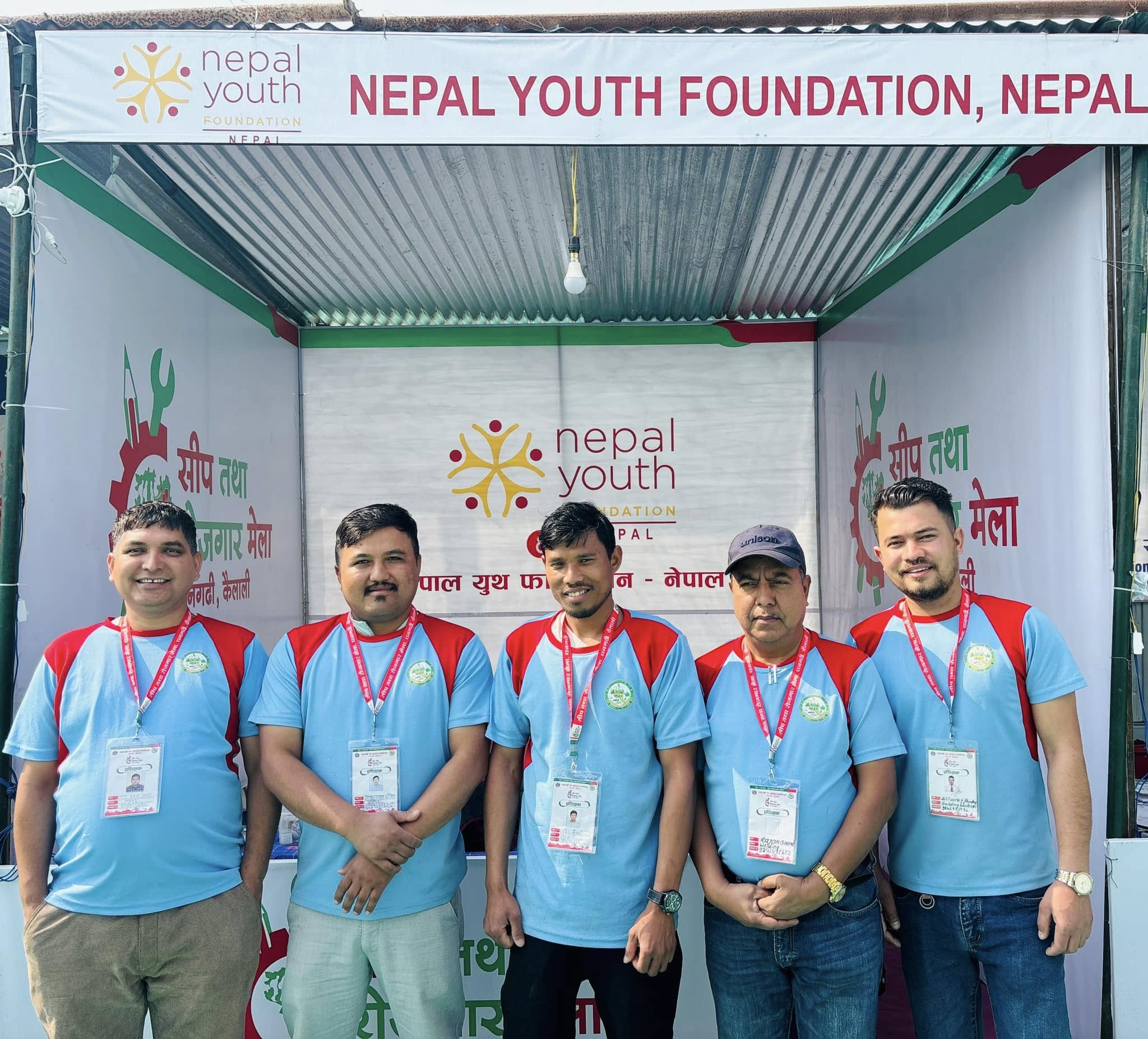
NYF’s work aligns with the UN’s Sustainable Development Goals for Nepal: creating dignified, well-paying jobs close to home allows young people to contribute directly to growing their local economies and improve living conditions nationwide. With the right skills, young professionals now have more opportunities to establish stable careers in Nepal’s expanding economy.
Even after the Skill Fair ends, NYF will continue providing vocational training in Dhangadhi, ensuring that Sudurpashchim’s workforce remains strong and competitive. This initiative represents a turning point for the region—expanding career choices, supporting thriving local economies, and strengthening Nepal’s industries.
Through strategic partnerships and hands-on training, NYF and OVS are creating real opportunities—helping Nepal’s workforce grow and thrive within the country.
Psychological Care Camp at Olgapuri
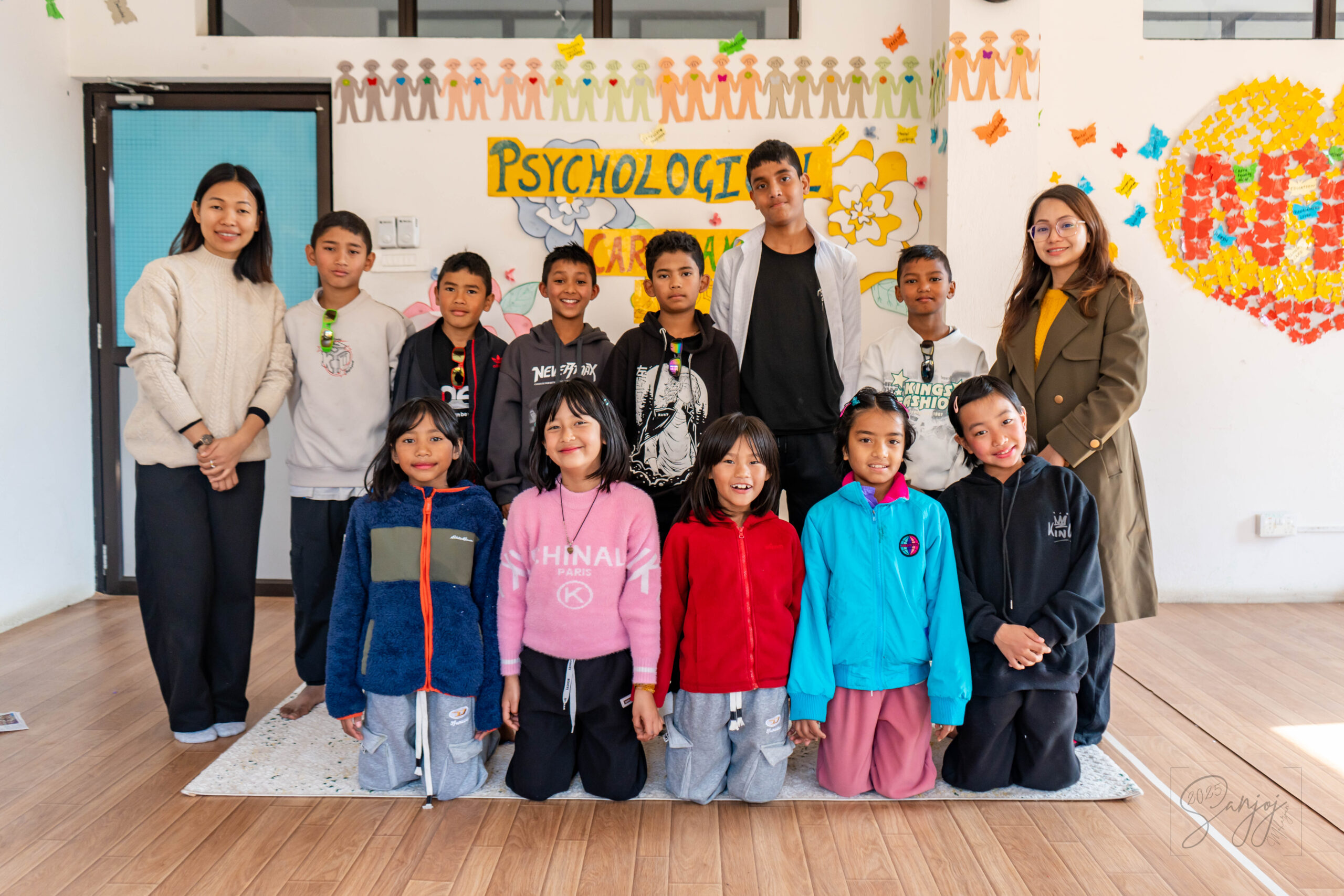
Every spring, as the school year winds down and the holiday break begins, the Ankur Counseling Center team steps in with a unique and impactful initiative for the children at Olgapuri Children’s Village (OCV) — the Psychological Care (PC) Camp. Designed to provide both fun and growth, these camps create a supportive environment where children develop essential psychological skills through creativity, play, and hands-on activities.
Fostering Self-Awareness Through Engaging Themes
In 2024, the PC Camp focused on children in Grades 3-4, with the central theme of Self-Awareness. Over five enriching days, the camp explored different facets of self-understanding, encouraging children to connect deeply with their emotions, social relationships, and personal aspirations.
- Day 1: All About Me
The camp kicked off with activities centered on self-discovery. Children shared their favorite things, discussed their roles and responsibilities within the Olgapuri family. As well as explored their feelings and learning healthy ways to regulate emotions. - Day 2: My Social Circle
The focus shifted to relationships, with discussions about their biological families, Olgapuri family, and friendships. Through storytelling and drawing family portraits, children reflected on cherished memories and the importance of connection. - Day 3: Knowing Myself
Activities like mask-making helped children differentiate between their public and private selves. They also explored the concept of the real vs. ideal self, promoting self-acceptance and authenticity. - Day 4: Loving Myself
A day dedicated to self-compassion, children engaged in mirror exercises, practicing positive self-talk and affirmations. They identified personal strengths, celebrated physical features and qualities, and highlighted meaningful aspects of their lives. - Day 5: My Dreams, Hopes, and Wishes
The camp concluded with collage-making sessions, allowing children to visualize their dreams and aspirations. A reflective review of the camp helped consolidate their learning experiences.
At the camp’s closing, each child received a “strength name” — a title reflecting the positive qualities and behaviors they exhibited throughout the week. This recognition not only boosted their self-esteem but also reinforced their unique identities within the Olgapuri community.

Creative Activities for Holistic Growth
Undoubtedly, the PC Camp activities were designed to be interactive and meaningful. From crafting masks to symbolize different aspects of the self, to engaging in clay work for self-expression and healing, every exercise was thoughtfully curated to enhance emotional intelligence. Moreover, storytelling sessions, family portrait drawings, and hands-on projects helped children internalize lessons in a fun, memorable way.
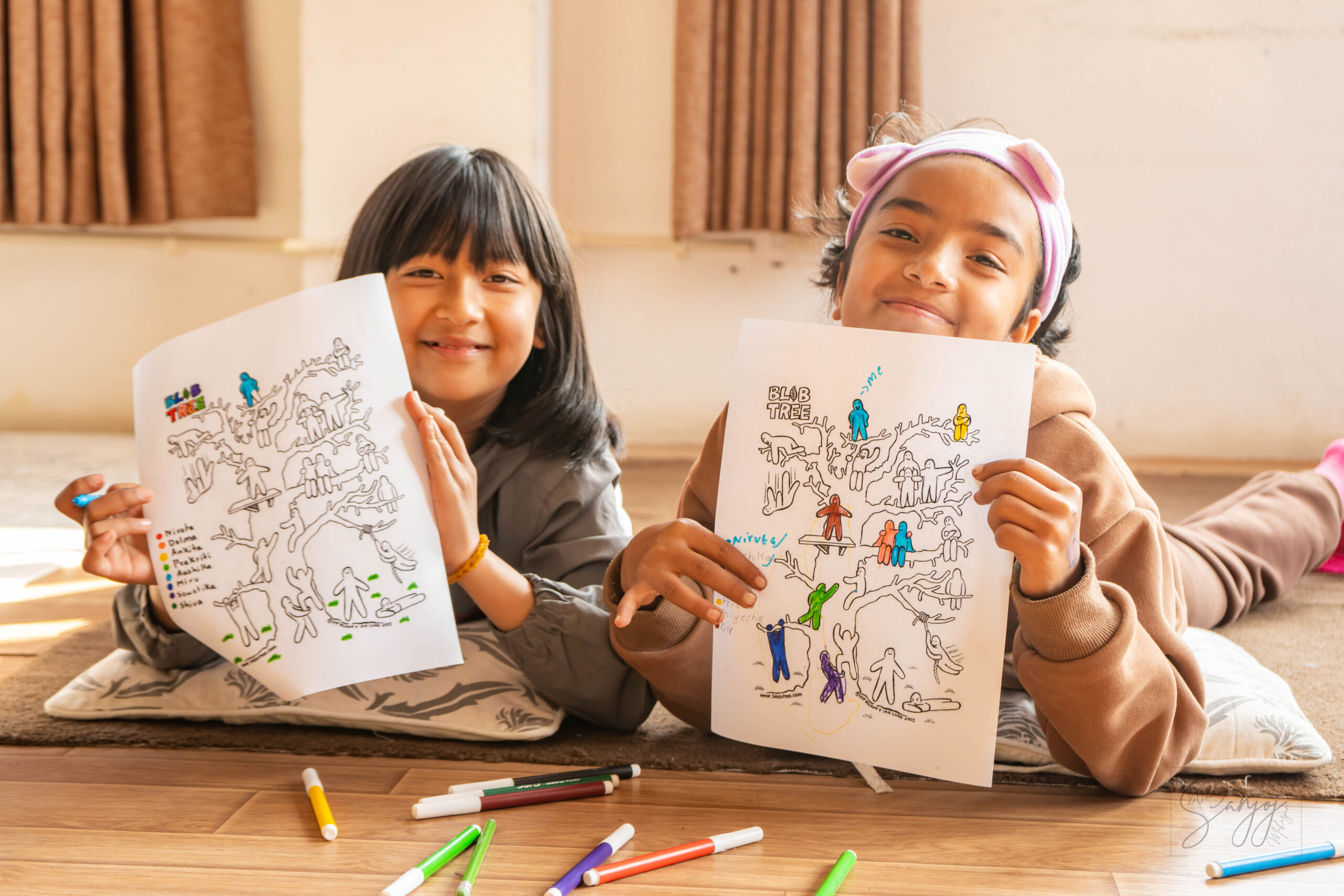
Ankur Counseling Center: A Pillar of Mental Health Support
Beyond the annual PC Camp, the Ankur Counseling Center plays a vital role in the day-to-day lives of Olgapuri children. The center offers individual and group counseling, skills workshops, and support for house parents. Mental health care is seamlessly integrated into the children’s routines, fostering strong, healthy habits from an early age.
Following the profound loss of NYF’s founder, Olga Murray, in February 2024, Ankur’s role became even more critical. Olga, a beloved grandmother figure to many at Olgapuri, left an indelible mark on the hearts of the children. The Ankur team organized age-appropriate group sessions to help the children process their grief, complemented by a private memorial event where children shared heartfelt memories of Olga.
These efforts not only supported the children through their mourning but also reinforced the stability and permanence of Olgapuri as their home. The compassionate approach taken by Ankur and the Olgapuri team has proven instrumental in helping the children navigate this emotional journey with resilience and hope.
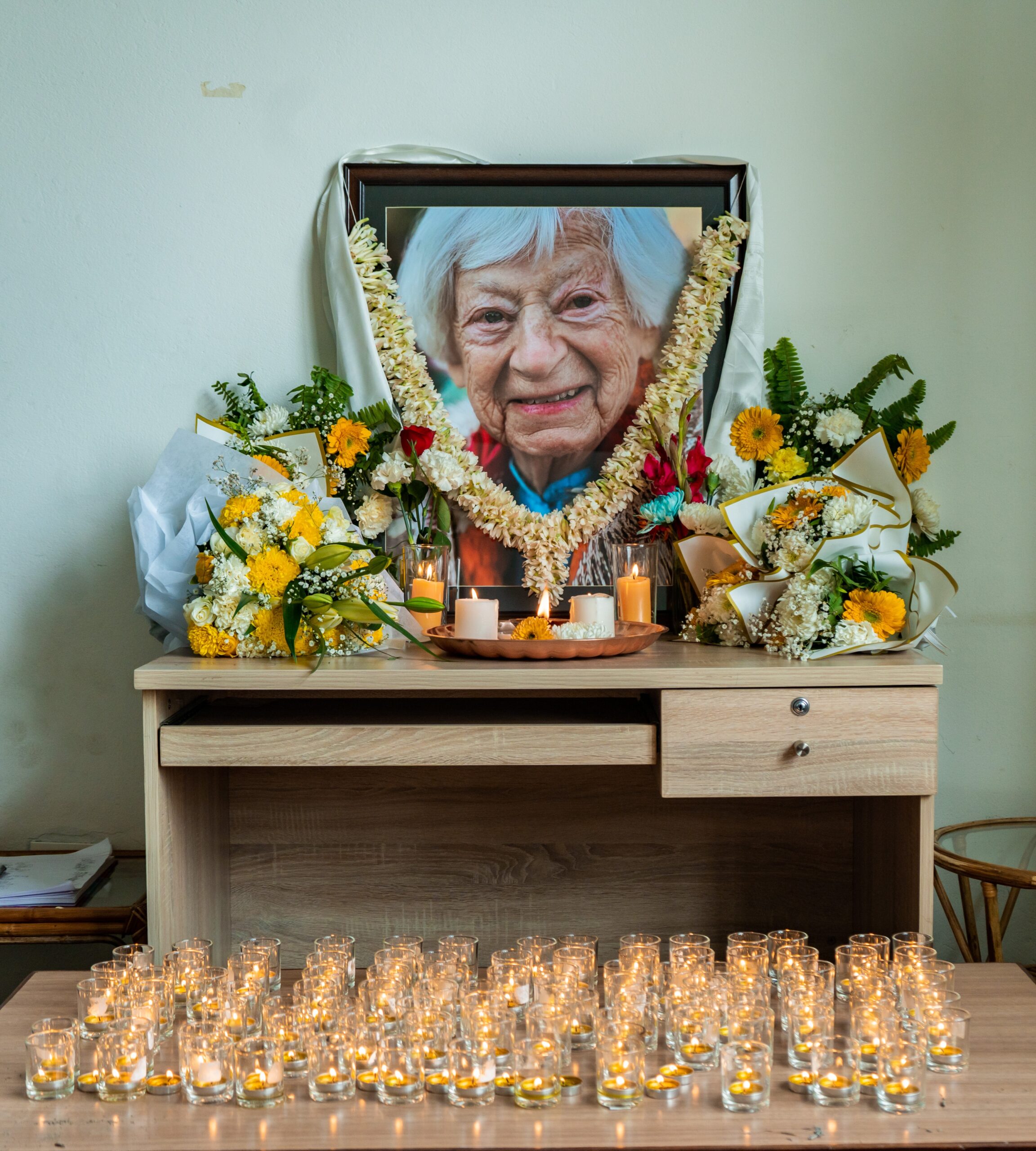
Building Trust, One Camp at a Time
Psychological Care Camps at Olgapuri are more than just seasonal activities; they are integral to NYF’s commitment to holistic child development. By addressing emotional well-being alongside physical health and education, these camps help children build confidence, develop coping strategies, and foster a sense of belonging.
Through Ankur Counseling Center’s dedicated efforts, Olgapuri remains a nurturing oasis where every child can thrive, heal, and dream.
NYF is so grateful to our generous donors for helping us provide a healthy upbringing for the remarkable kids at Olgapuri Children’s Village. Watching these kids grow and thrive is such a privilege for our team—and it creates incredible opportunities for the future for each child. Dhanyabad!
How we celebrated Olga’s life on Feb. 20th
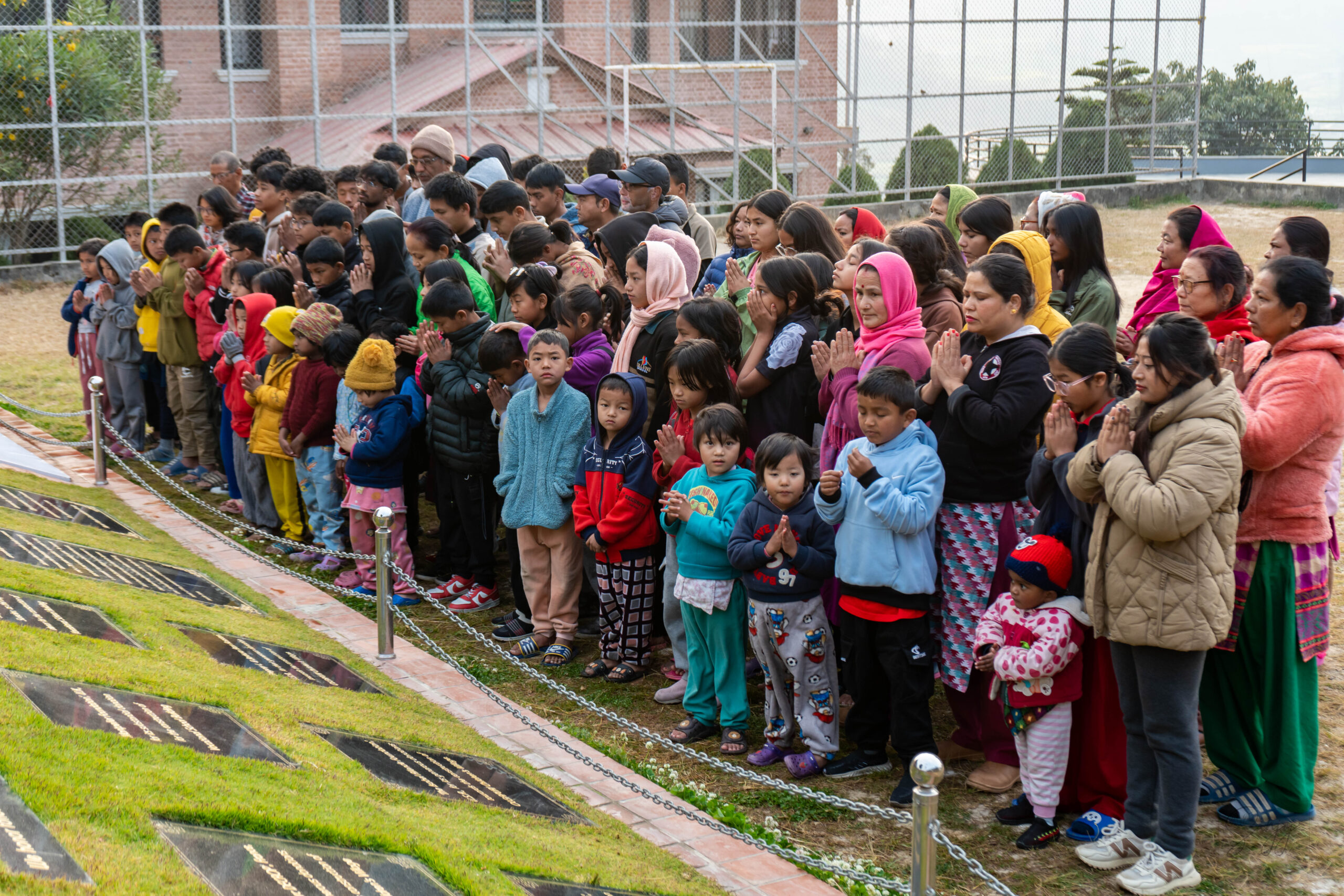
The following is a letter from NYF President Som Paneru describing how the NYF Community in Nepal celebrated Olga’s life on the first anniversary of her passing. This letter was sent to our mail subscribers on February 20, 2025. If you did not receive this letter in your inbox and would like to, please subscribe to our email list here: https://nyf.news/join-us.
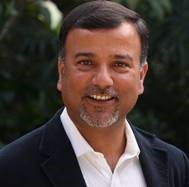
Dear Friends,
Today, the first anniversary of Olga’s passing, has been a bittersweet and heartfelt occasion here in Kathmandu.
In Nepal, the first anniversary following a loss of a loved one holds special significance, both religiously and culturally. As we approached this first anniversary, many of us felt drawn to celebrate Olga’s life in the ways we would honor the elders in our own families.
Our team put a great deal of thought and care into creating a day of remembrance especially for our beloved Olga didi. A day which commemorated Olga’s life and honored her unique place among us here in Nepal. A day which celebrated her role in bringing our diverse team together in this transformative shared mission.
Early this morning, the Olgapuri children, house parents, and Olgapuri staff members gathered at Olga’s statue for a private ceremony, offering flowers and sharing memories of their time with her.

Later, most of NYF’s Nepal staff, our Nepal-based board, and current Olgapuri Vocational School (OVS) trainees walked together from the OVS parking area to Olga’s statue (located at the donor dedication wall) for a larger flower ceremony and a moment of group reflection.
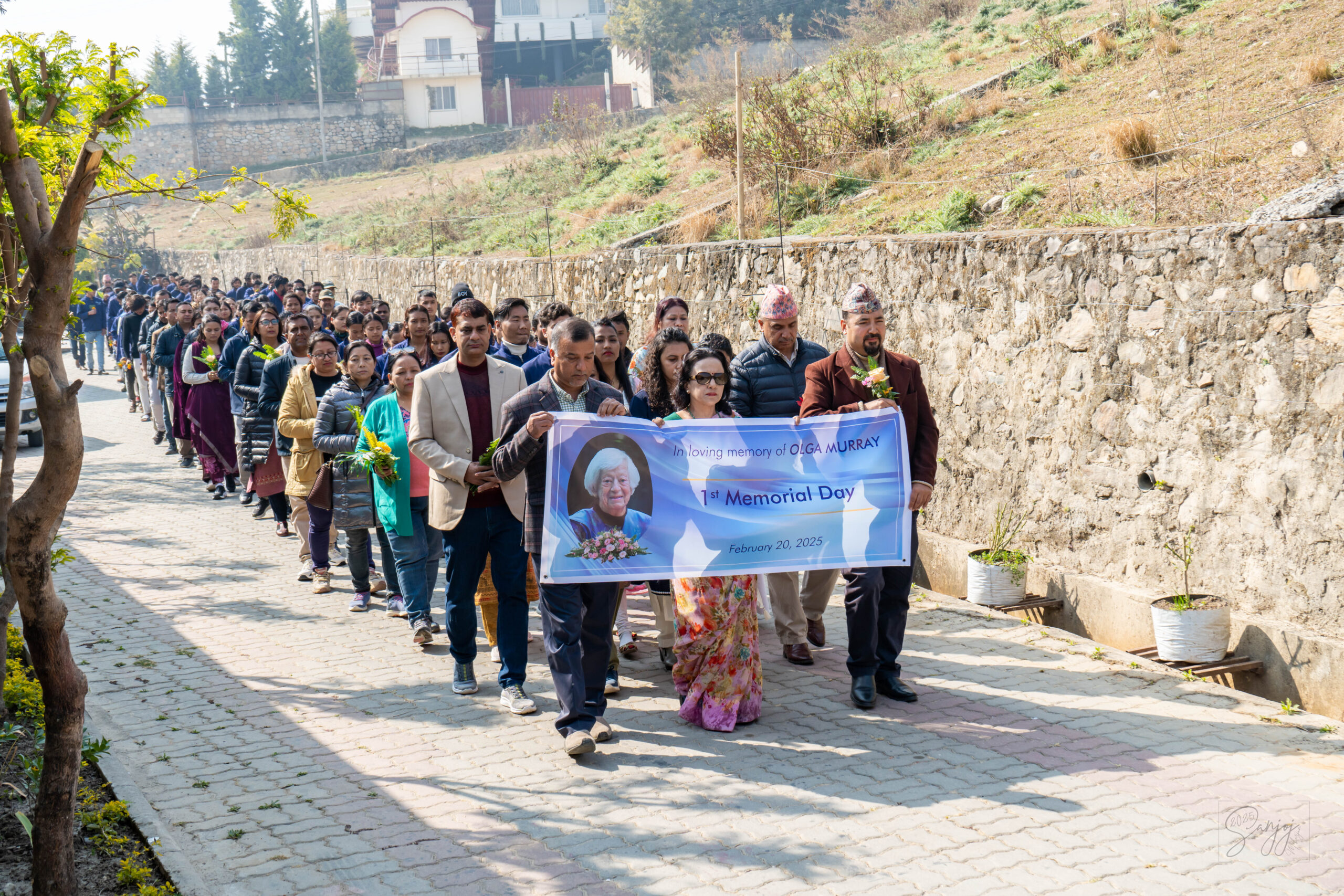
After lunch, several members of NYF leadership traveled to the Nepal Law Campus in Kathmandu, where many of our Educating Dalit Lawyers scholarship recipients are attending law school. Together, NYF and Nepal Law Campus have established a new award in Olga’s name: The Olga Murray Excellence Award for Law Students.
This award will be given to one young woman and one young man every year: those who have received the top scores on the nationwide law school entrance exam. Since Olga believed in the power of education, justice, and kindness, this award is given to students who we believe will uphold these values and translate them into their lives. Today marked the first award ceremony of many. Our first award recipients are Isha Paudel and Sarin Kadel.
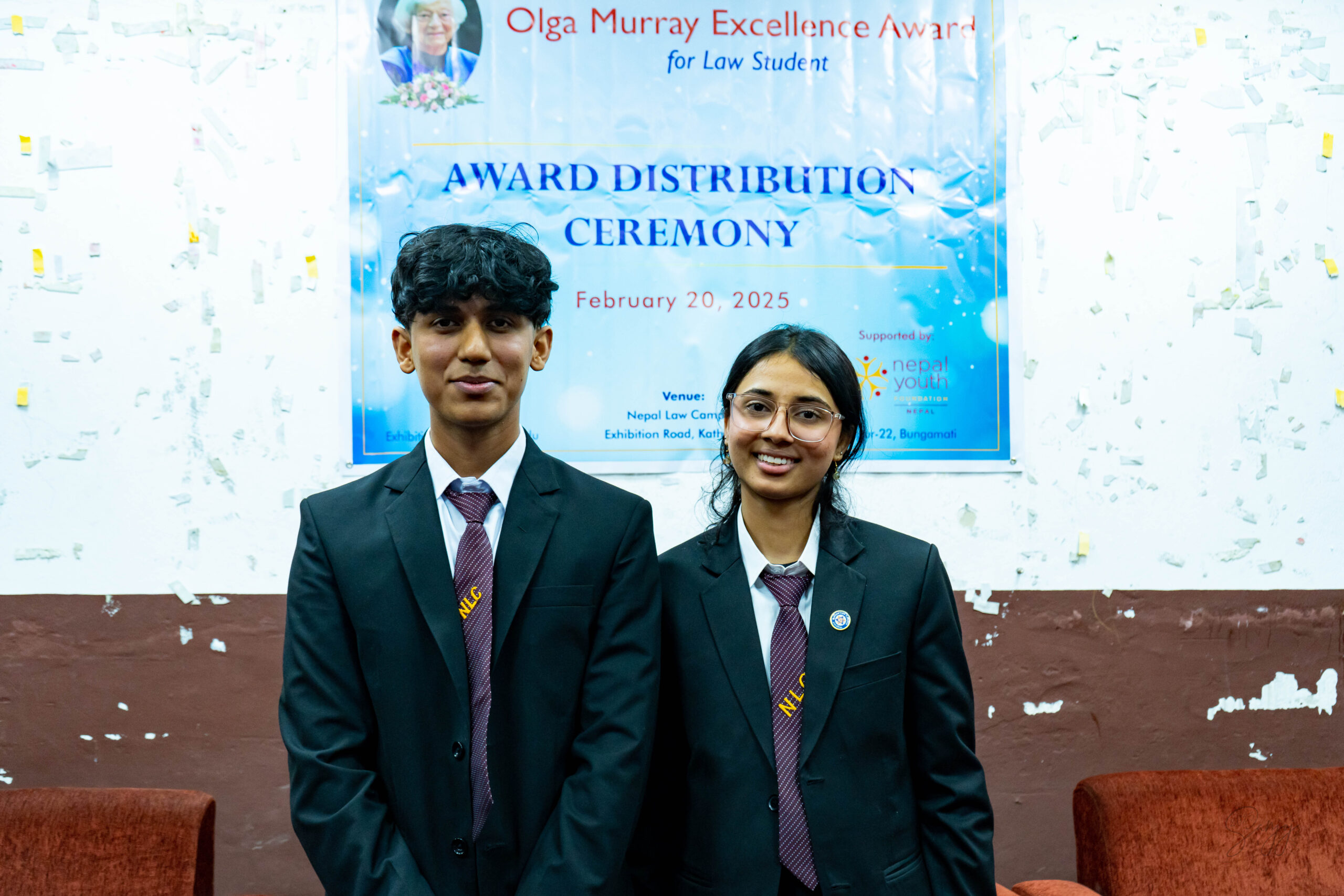
Back at Olgapuri Children’s Village, after dinner, the children and house parents once again gathered at Olga’s statue, this time to light butter lamps in Olga’s honor. Butter lamps are a common sight in Buddhist temples and monasteries throughout the Himalayas.

108 butter lamps were also lit in Olga’s honor by Buddhist nuns at the Maya Devi Temple in Lumbini District. This ancient temple is a UNESCO World Heritage Site and is traditionally considered the birthplace of Gautama Buddha. The site held special significance to Olga, and this recognition of her life highlights the deeply felt impact she has had in Nepal.
Finally, following the lamp lighting, the Olgapuri children gathered again for a heartfelt evening of connection, the sharing of memories, and the celebration of Olga’s love for the children themselves. Olga never wanted attention on herself. She always preferred to focus on uplifting the children around her. To honor this, the Olgapuri House Parents distributed special awards to the children, celebrating traits like leadership, compassion and kindness, excellence in sports, academic achievement, and integrity and service.

It has been a long day, with many events. We have laughed and celebrated in Olga’s memory—and we have also shed tears as we reflected on this time without her. We hope you have enjoyed the photos from these beautiful moments.
Throughout this day, I have been reminded many times of the wonderful work Olga made possible during her lifetime. And I have been reminded of my gratitude to you all, our remarkable community of supporters, who have so lovingly continued Olga’s incredible work during the past year.
Thank you for committing to our shared promise to Nepal’s children.
With love and gratitude,
Som Paneru
NYF President
One Year Without Olga Murray
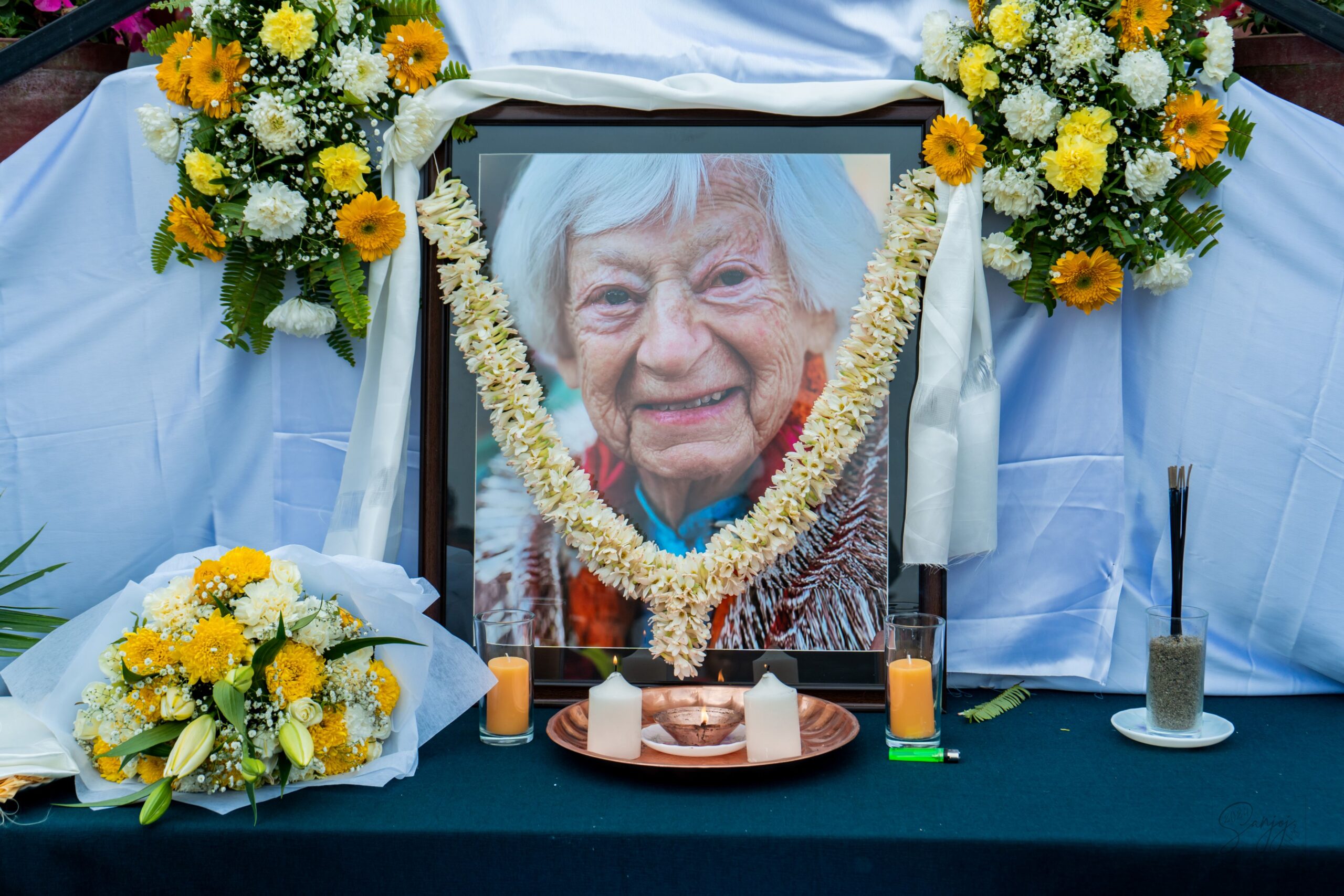
A letter from NYF’s U.S. Team
As we near the one year anniversary of Olga Murray’s passing, our small U.S. team at the Nepal Youth Foundation (NYF) has been reflecting on the incredible life and legacy of our beloved founder. Olga’s vision, compassion, and unwavering belief in the potential of Nepali children have guided us through this past year as we continue to carry forward her life’s work.
Click here to visit Olga Murray’s memorial page to make a legacy donation in her honor, write a tribute message, and read more about her life and legacy.
What we’ve learned from Olga’s legacy of love and action
Earlier this year, in preparation for this letter, our team sat down together to share what we learned from Olga. Our discussion was long and varied, but one teaching sat unanimously at the top of our lists: “You’re never too old to pursue your passion.”
Olga founded the Nepal Youth Foundation in 1990, as she concluded her legal career in the California State Supreme Court. Already in her 60s, she embarked on what would become an extraordinary journey of service and passion, expanding her life in ways only few imagine. Just two years ago, during her last trip to Nepal in December 2022, she helped to launch NYF’s Caste Equality Project to fight caste-based discrimination in Dalit-majority villages in eastern Nepal. She was 97 at the time.
The mere existence of NYF will forever serve as a reminder to us all that it’s never too late to pursue a passion—and make a profound difference in the world at the same time.
Values we carry forward from Olga
One of Olga’s greatest gifts was her ability to see every individual she meets as a whole person—each with their own unique set of dreams, motivations, strengths, and quirks. Whether she was engaging with beneficiaries, staff members, or donors, Olga made genuine connections with each person. She understood that even from an organizational point of view, each person was more than just a number, or a donation, or a success story. To this day, we are determined to carry this philosophy forward in our continued work. It’s what makes NYF’s approach to our work so unique.
From the very beginning, Olga emphasized the importance of locally-led, community-driven programs. As she wrote in Olga’s Promise: “Perhaps most important of all is our conviction that the success of our undertakings depends on the buy-in, expertise, wisdom, and enthusiasm of the Nepali people themselves.” This principle continues to anchor our work. Every initiative we take on—whether at Olgapuri Children’s Village, through the Caste Equality Project, or our Nutritional Rehabilitation Home—is deeply rooted in the needs and leadership of local communities.
“Olga was a master storyteller, an optimist who believed everything would work out as it should. She was someone who embraced life’s twists and turns with confidence and grace. She taught us to lead with compassion and determination, to finish what we start, and to never lose sight of the joy in the work we do.”
Ryan Walls, U.S. Executive Director
Sustainability, compassion, and the long game are at the core of everything we do. Olga so often reminded us that small actions, when aligned with purpose, can create lasting change. When we speak of these values, we often reflect on the Empowering Freed Kamlaris program, which NYF launched in the early 2000s. Spanning over two decades, this program helped eradicate the harmful Kamlari practice, providing education and leadership opportunities for thousands of formerly indentured girls.
The Freed Kamlari Development Forum (FKDF)—established by the young women who once participated in the program—continues to thrive today, leading advocacy efforts and community development work. This sustainable, community-led model has become a blueprint for future initiatives like the Caste Equality Project, which is already making strides in dismantling caste-based oppression and expanding access to education and legal advocacy for Dalit communities.
We’re combining the lessons learned from Empowering Freed Kamlaris with our strong reputation as a committed scholarship provider to support young Dalit students in their journey to become human rights lawyers. By investing in the next generation of Dalit leaders, we remain focused on building a future rooted in justice and equality.
Over the past year, we have taken each of these values and lessons to heart, ensuring Olga’s legacy continues to shine brightly. From our work at Olgapuri Children’s Village to our Caste Equality Project, Nutritional Rehabilitation Homes, and beyond, we have remained focused on empowering Nepali children and communities. These programs honor Olga’s vision of creating opportunities and fostering hope, and there’s so much more to come.
Thank you to the NYF Community!
In 2024, we also saw an incredible outpouring of love and support from our NYF Community. Your belief in our mission and in Olga’s dreams have been our strength this past year. Every child we empowered, every family we uplifted, and every community we supported since last February is a testament to Olga’s enduring legacy.
As we look ahead, we remain laser-focused on the children who were always at the center of Olga’s heart. Her legacy is built through love and action, and it’s one we will honor by staying true to her vision of creating a brighter future for every child in Nepal.
Thank you for standing with us this year as we continue to celebrate Olga’s life by carrying her torch forward. Together, we are making her dream a reality and ensuring her story continues to inspire generations to come.
Plans for February 20, 2025
Our Nepal team has planned an entire day of loving celebrations to take place on February 20, 2025 at Olgapuri Children’s Village—so that students, staff, children, and other community members alike can come together on the one year anniversary of Olga’s passing to commemorate her life. This special day will include prayers, flower offerings, award distributions, and lots of opportunities to share stories. We’ll be sending out another email following this event with photos and more reflections about how the day went. (If you’d like to receive this email but haven’t yet subscribed to our list, please click here!).
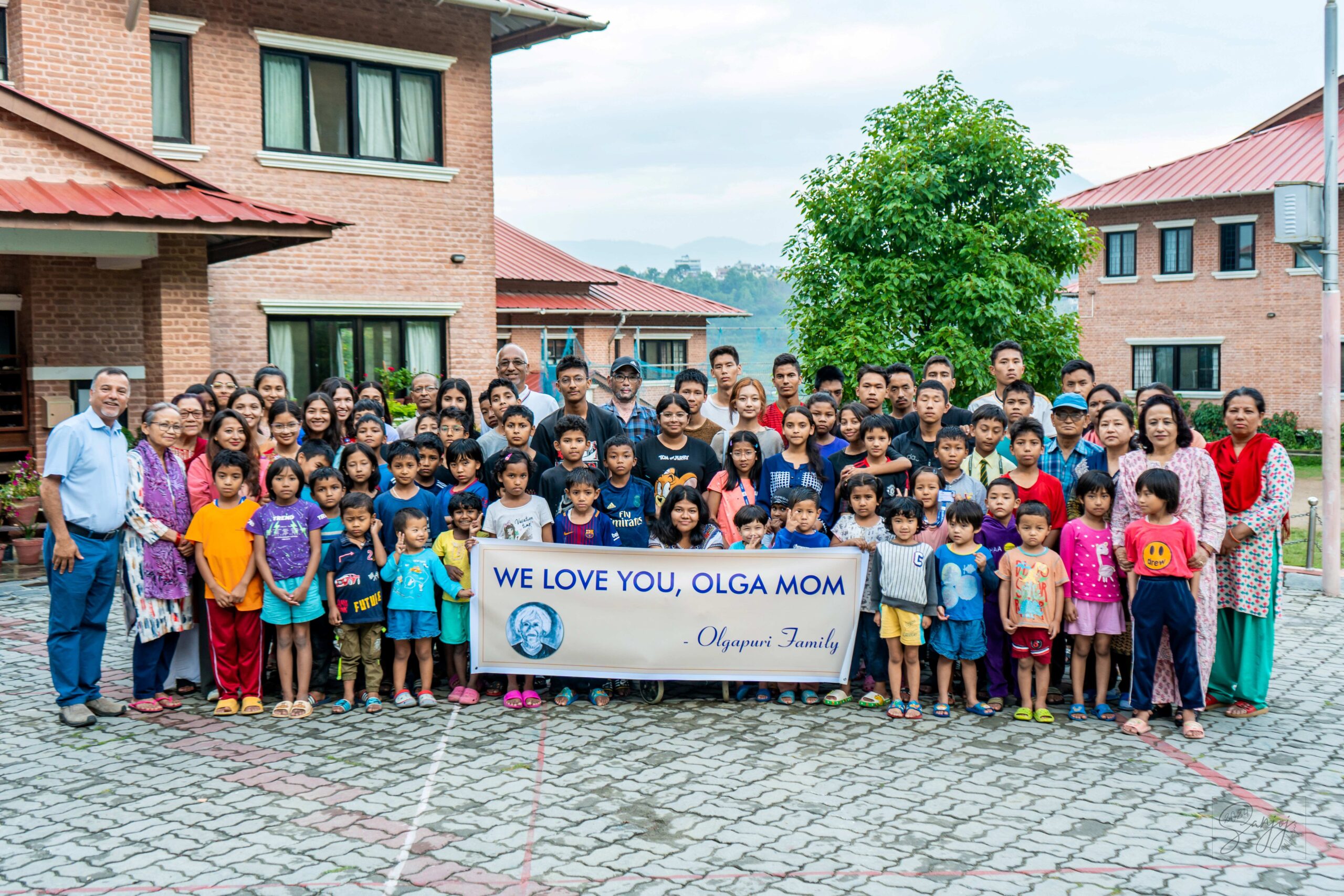
NYF Update: Regarding USAID
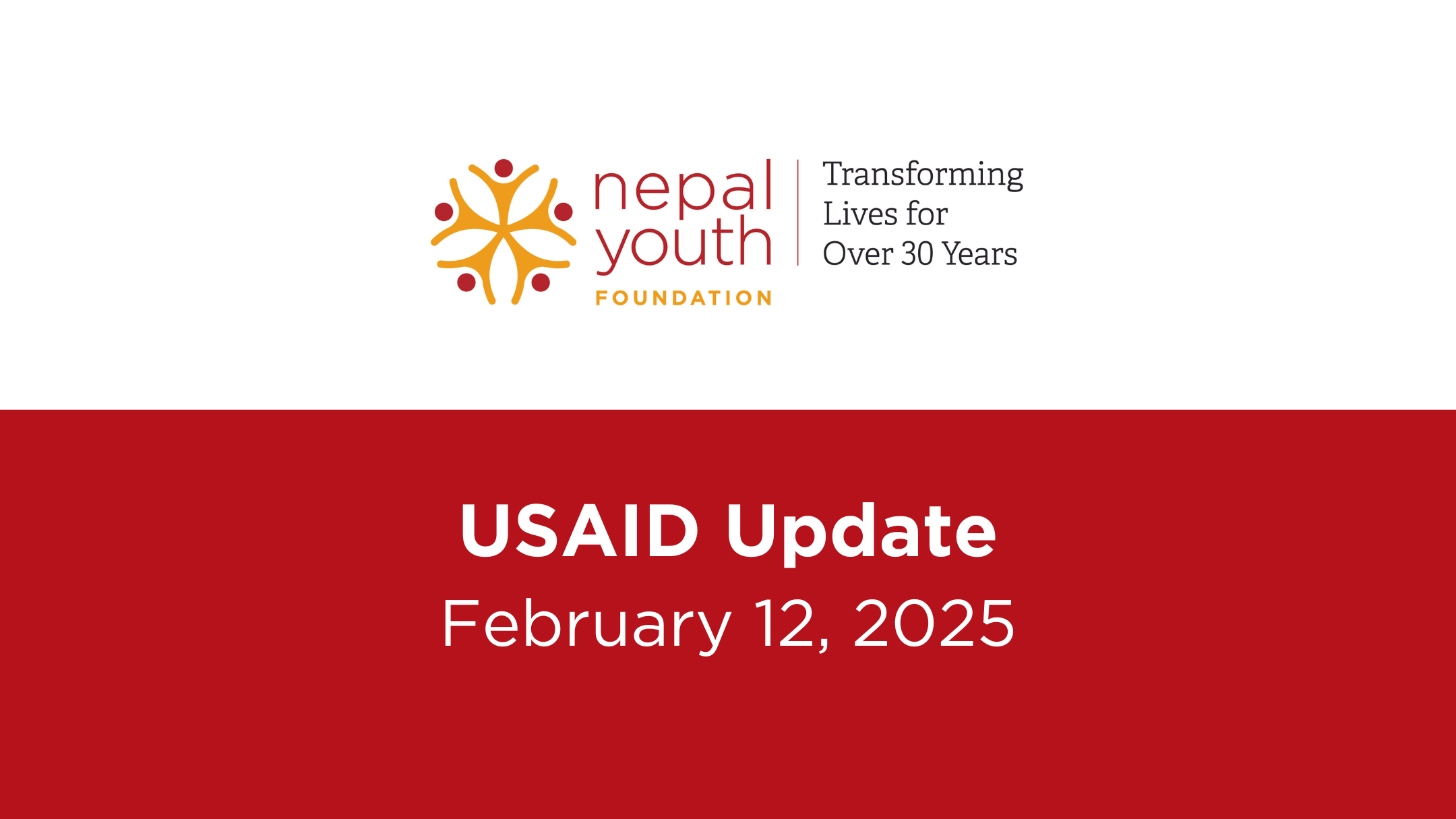
At NYF, we know our supporters value transparency, and up-front, frank clarity on the issues we, and the Nepali children we serve, are facing. We’re honored by your trust in our organization. It is your trust and support that have helped us transform the lives of over 60,000 children in Nepal—and it is that same trust that will strengthen us through this new period of uncertainty.
USAID
You may have heard that over the last several weeks, the United States Agency for International Development (USAID) has begun undergoing some dramatic changes.
USAID, established by President John F. Kennedy in 1961, is an independent federal agency, responsible for administering civilian foreign aid and developmental assistance. It is one of the largest official aid agencies in the world, and has historically focused on disaster relief, poverty relief, socioeconomic development, and more.
As the Trump administration makes sweeping changes to this agency, including a near-total freeze on all foreign aid, the international nonprofit world is deeply concerned about the future. At NYF, we are also concerned. However, when it comes to our work, we are also full of hope, determination, and stubborn optimism. And when it comes to NYF, we think you should be, too.
Reasons for Confidence
1) NYF does not and has never received funding from the US government, including USAID. (We also do not receive funding from the Nepali government.)
Organizations who do receive USAID funding will soon be working to make up for any changes to come. This may put these organizations in competition with NYF for funding sources. Our team is watching closely to track any changes in our fundraising success. As of today, our organization is maintaining our steady pace forward thanks to our incredible community of loyal supporters.
2) Our on-the-ground team in Nepal has decades of experience providing life-changing programs during unprecedented times. NYF was founded during an incredibly dynamic time in Nepal’s history. Since 1990, Nepal’s system of government has changed from a monarchy to a democracy. Nepal experienced a civil war between 1995 and 2005. We provided critical, immediate rescue and rebuilding resources after the 2015 earthquake. We provided robust, life-saving support during the height of the COVID-19 pandemic.
Lessons learned and expertise developed during these crises have made our programs stronger.
3) NYF’s global team is drawing on wisdom shared by our beloved late founder, Olga Murray. Our organization is deeply rooted in Olga’s practical, hard-won optimism—a trait she developed over a 98-year lifetime filled with political turmoil and change.
When she founded NYF in 1990, Olga knew that no matter what changes come, the best way to fuel sustainable transformations is by empowering the rising generation of children. We follow her remarkable example every day at NYF.
4) Our incredible community of supporters and friends has never let us down. Back in 2020, during the first days of the COVID-19 pandemic, our team had no way of knowing what was in store. In partnership with you, our loving donors, we navigated those years of uncertainty together, determined to continue providing world-class care to the children we serve.
We are so grateful to our incredible network of supporters for the ways you circled around us in love and trust during those challenging years—and we are confident that together, we will weather these new changes with strength as well.
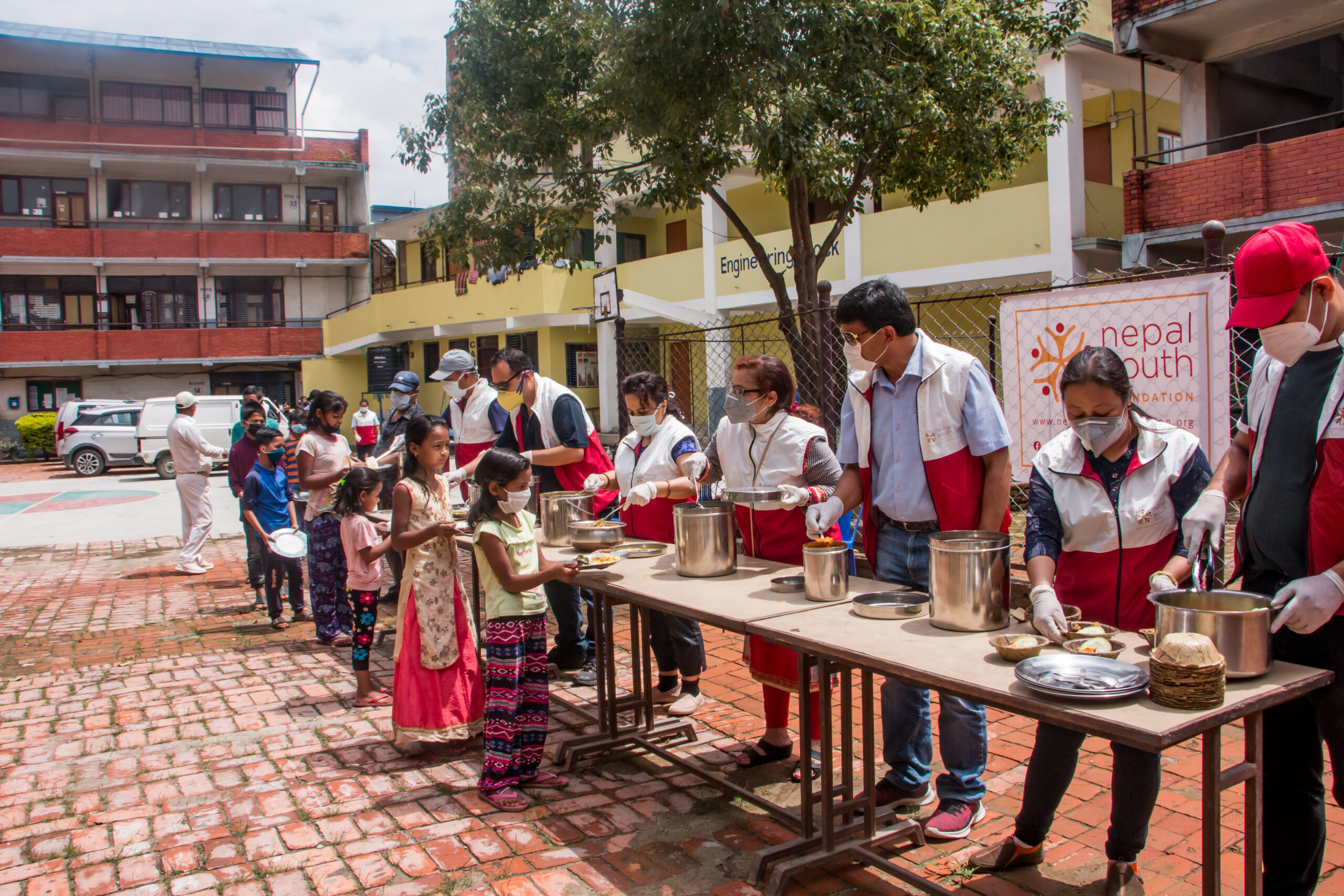
Our Commitment
NYF’s team is prepared to share updates with you if we find that our funding is being negatively impacted during the coming years, as well as insight into our responsive strategies. We’ll use the same frank, forthright messaging you’ve come to expect from us.
No matter what, our shared promise to Nepal’s children remains the same.
We are empowering Nepal’s next generation of forward-facing leaders. Generous support from friends all over the world has made this work possible for almost 35 years. At NYF, we have every intention of continuing this transformative journey for decades to come.
Thank you for meeting the moment with us.
With gratitude and determination,
The NYF US Team
Questions?
P.S. Please feel free to reach out to our team with any questions or concerns you may have about the ways NYF is impacted by current events.